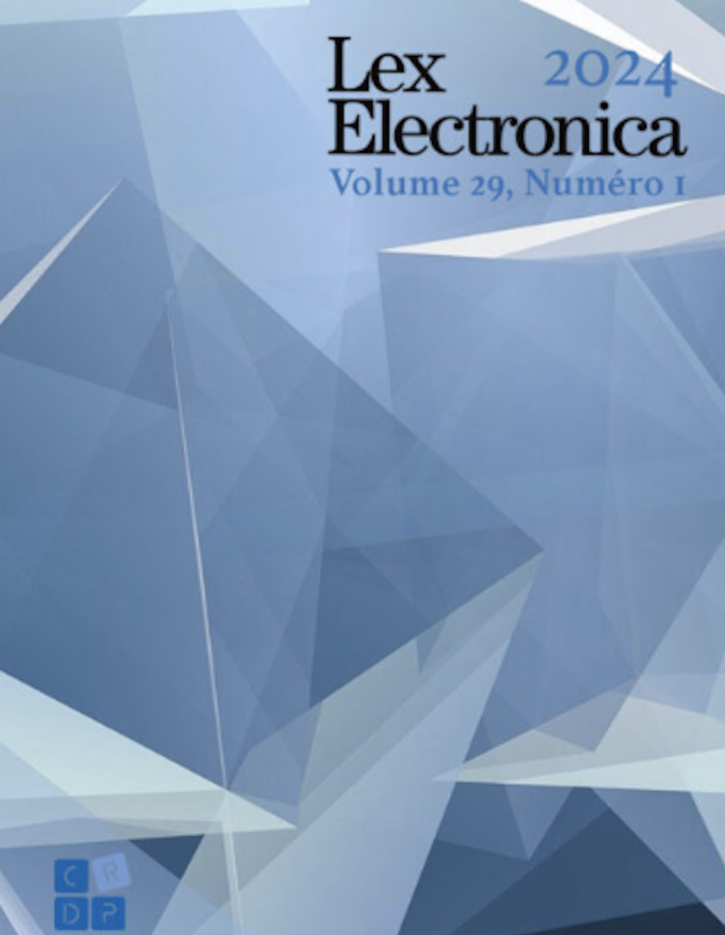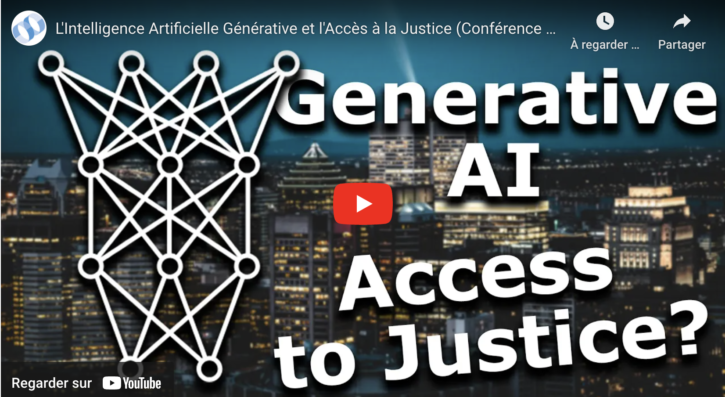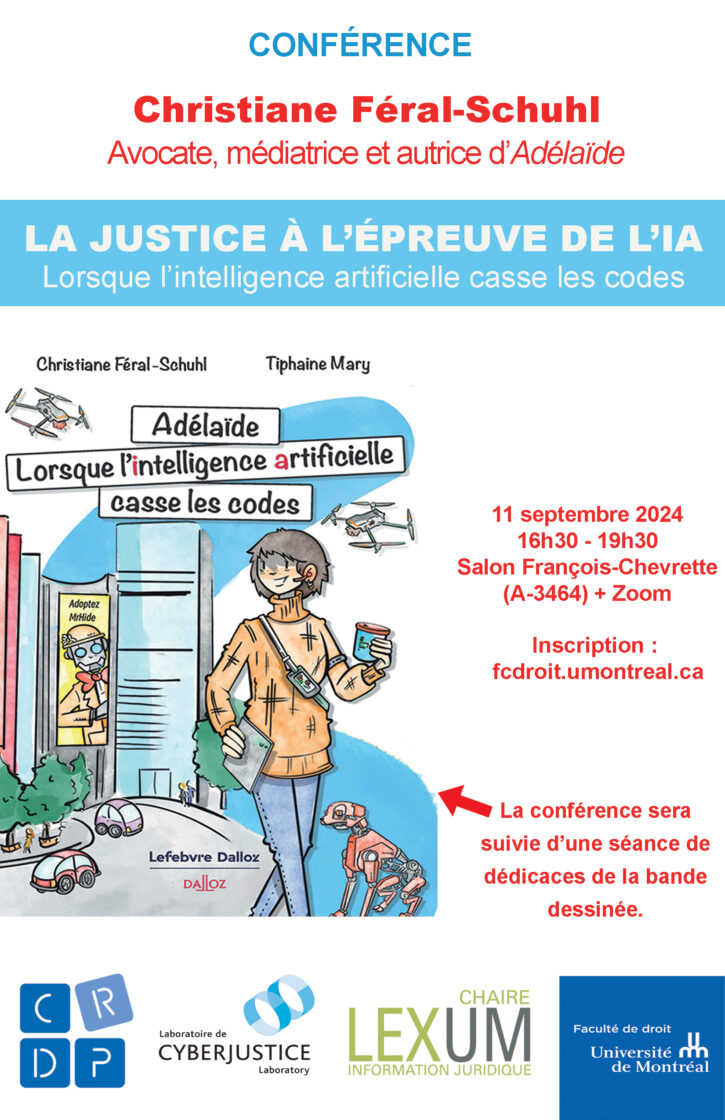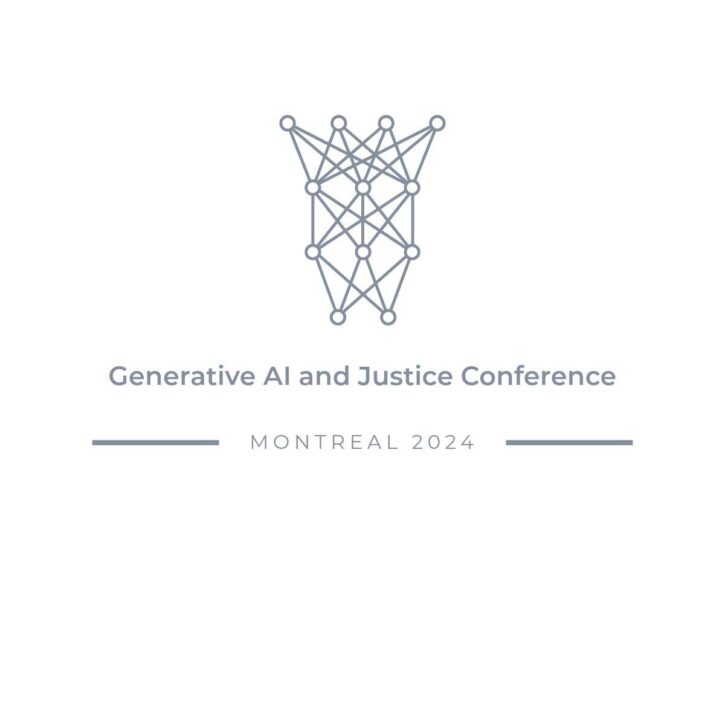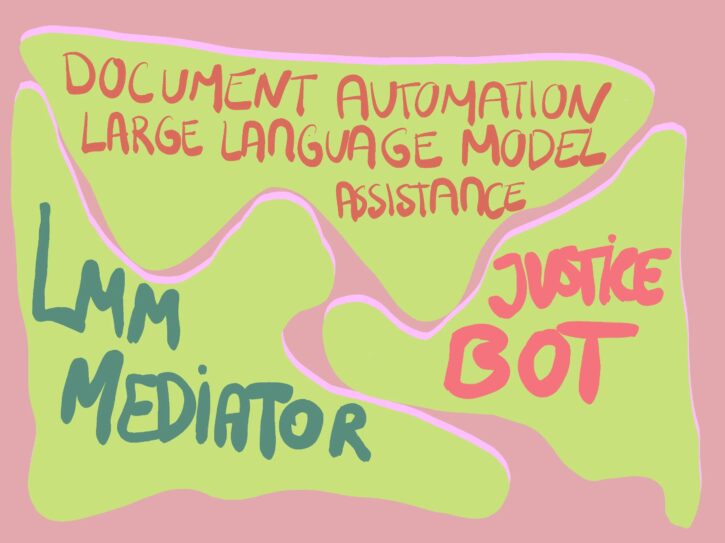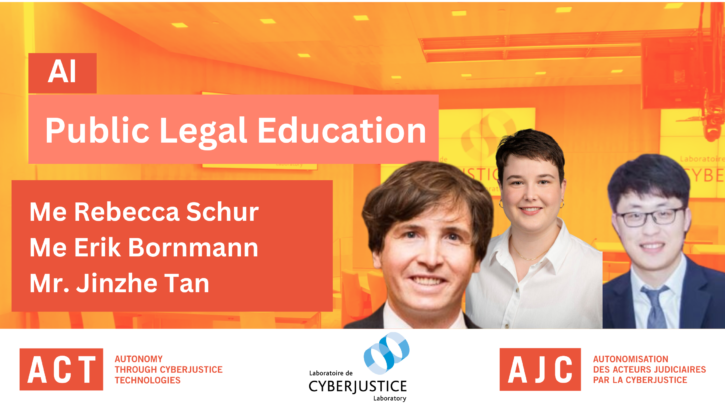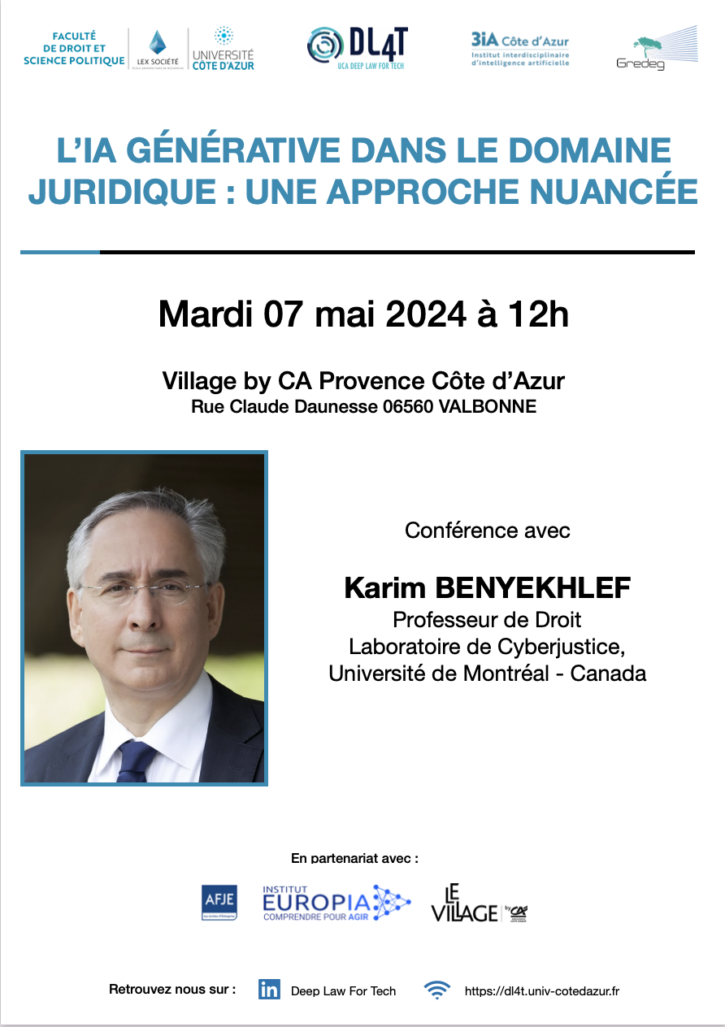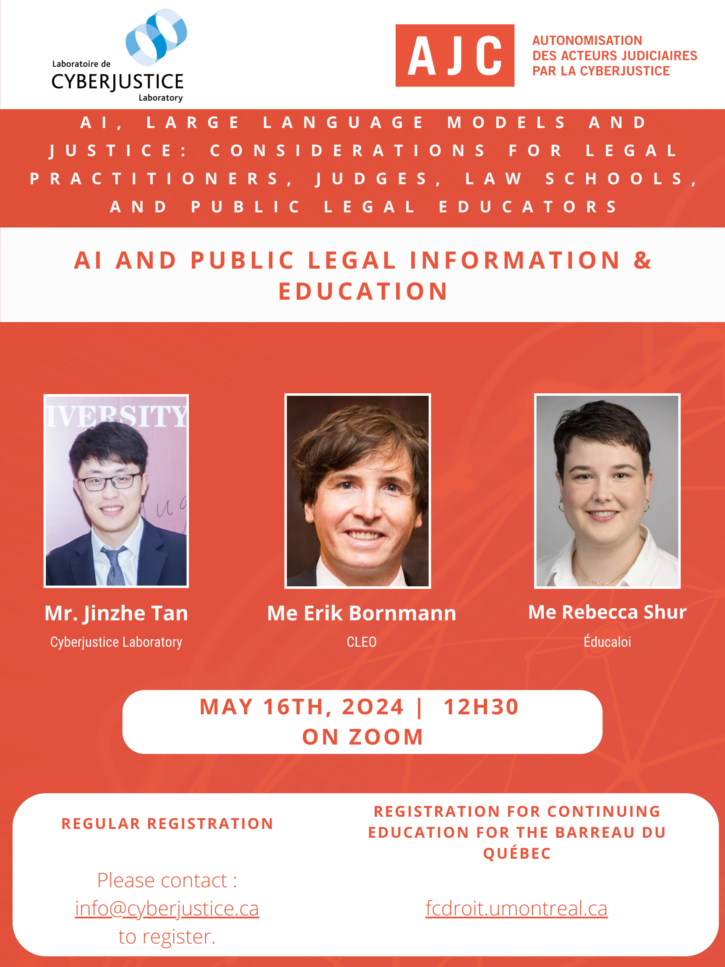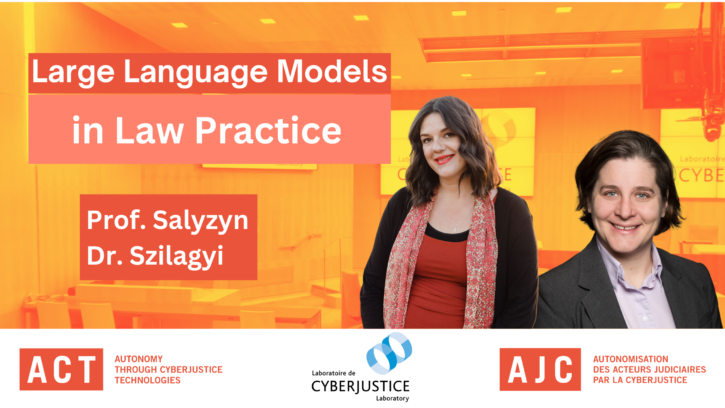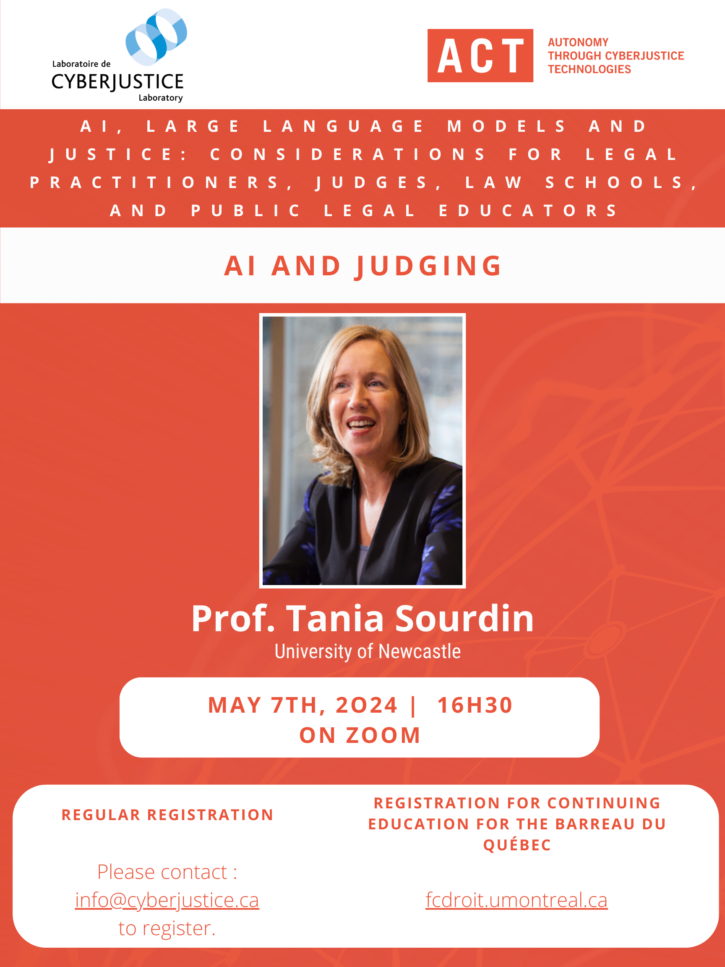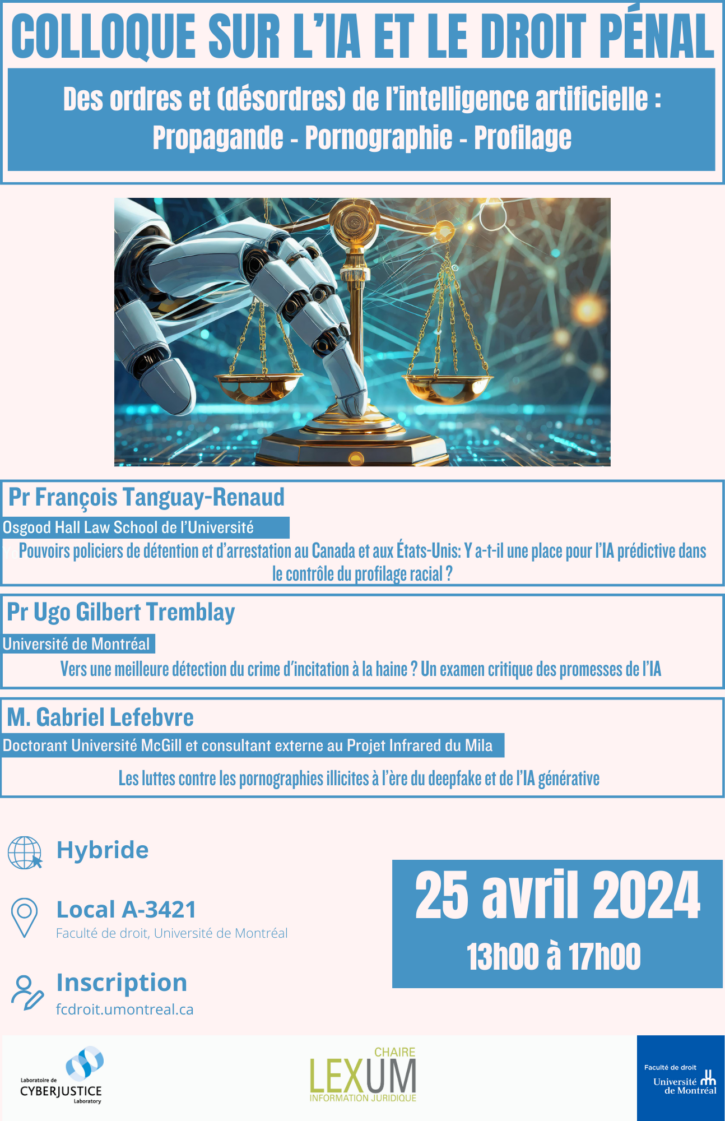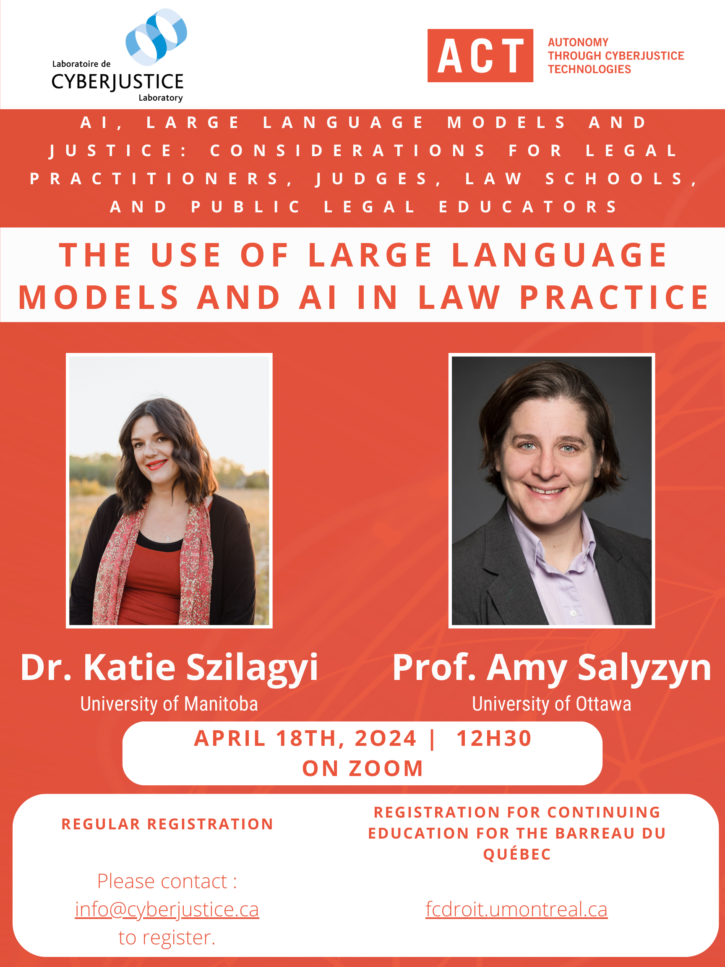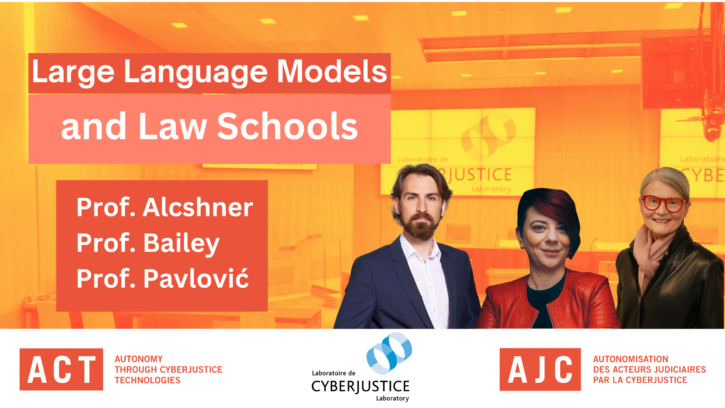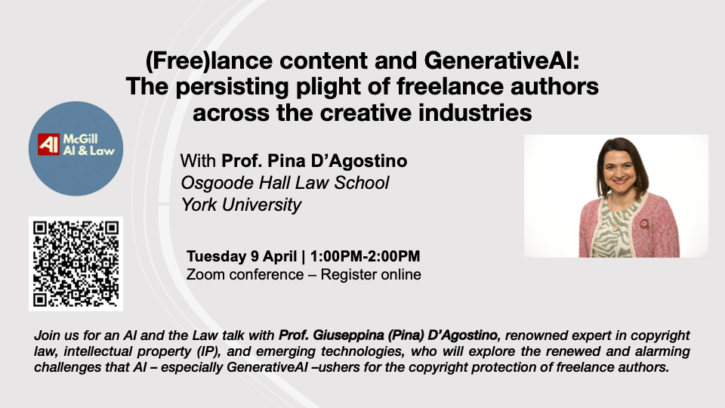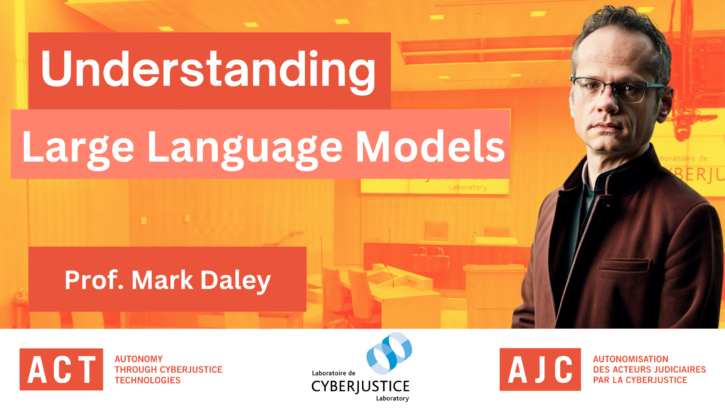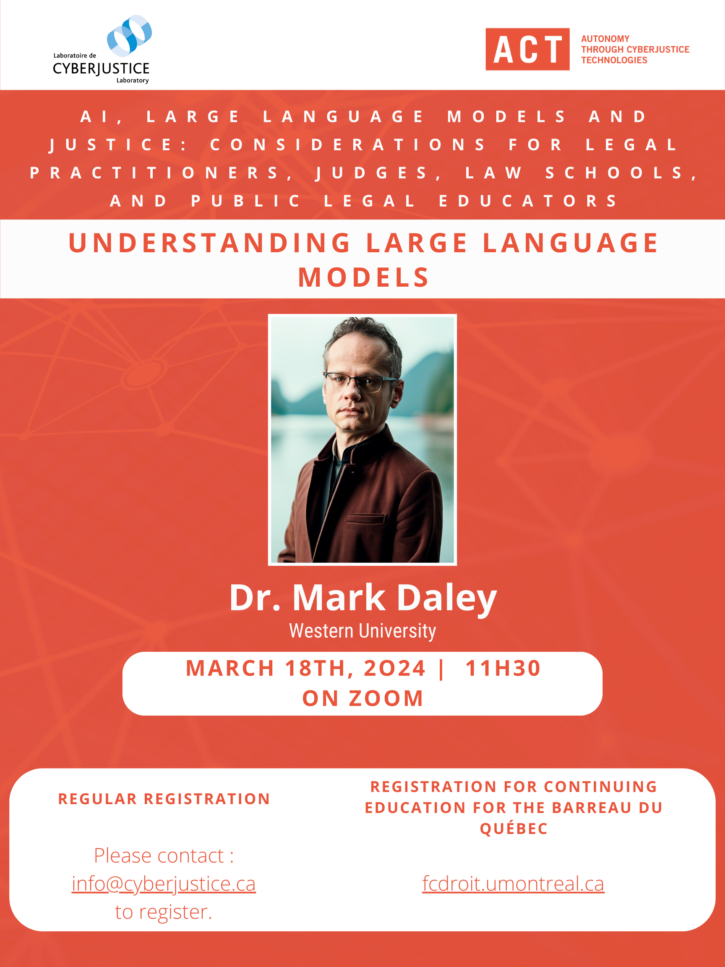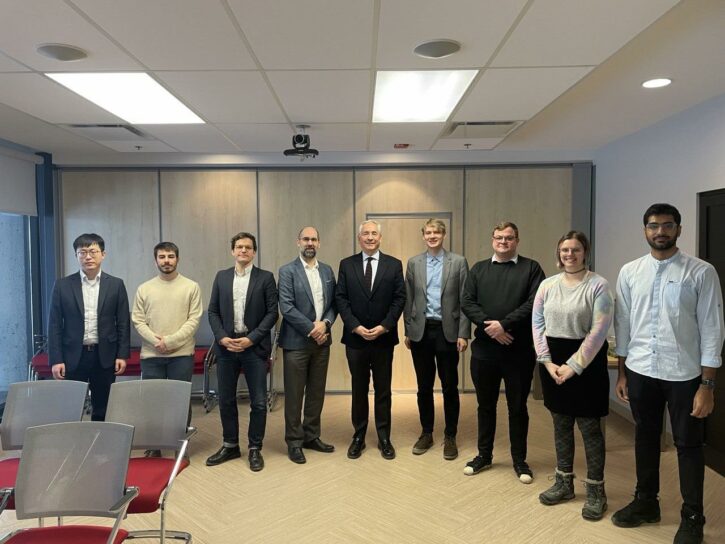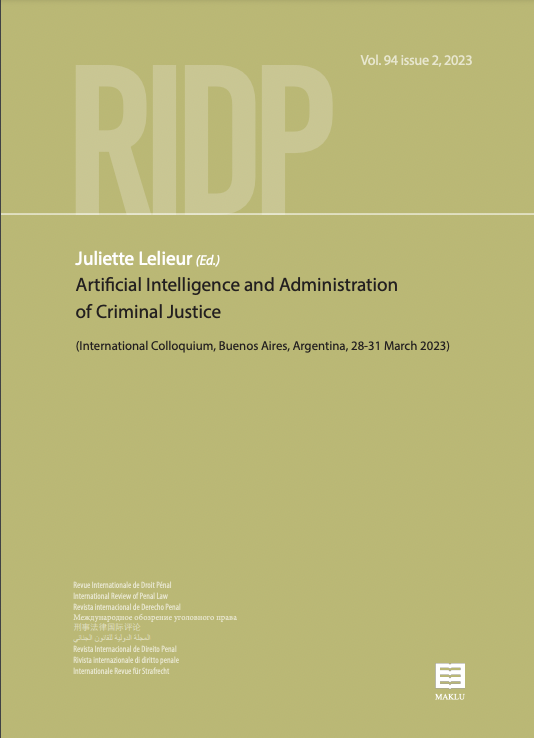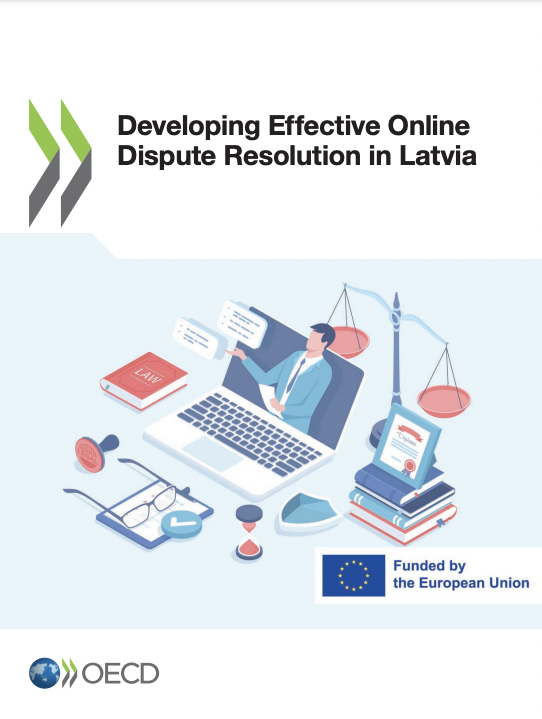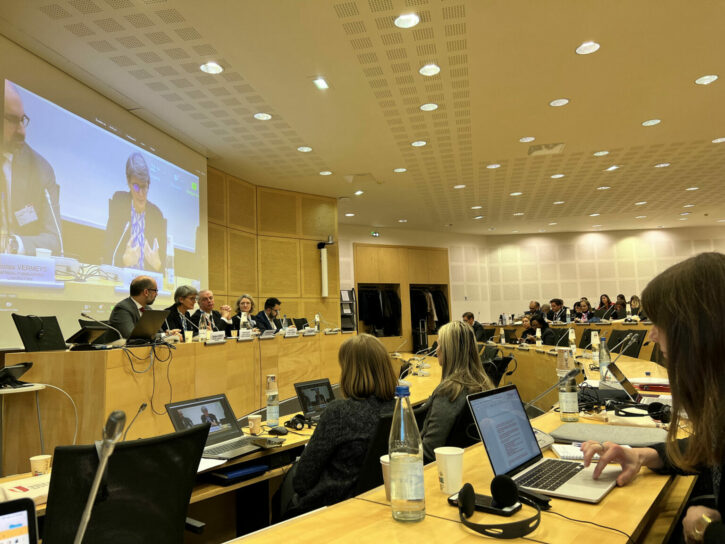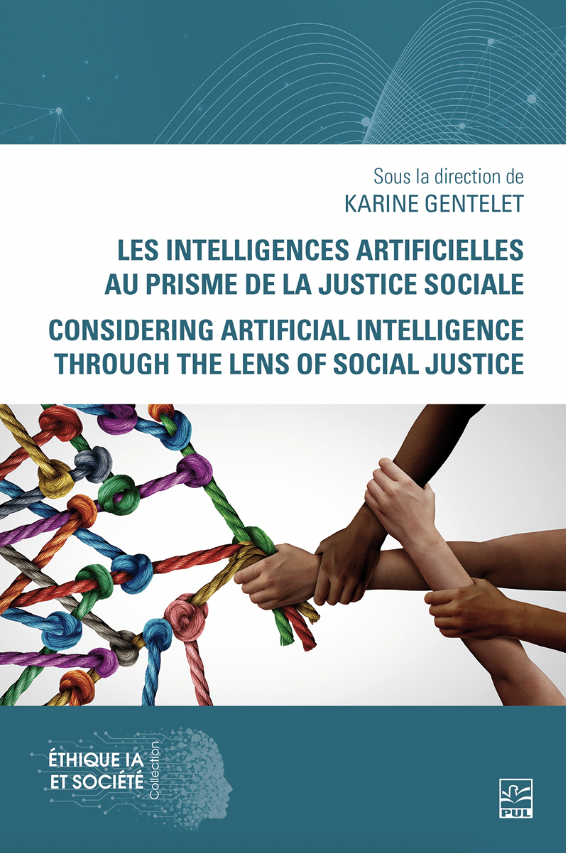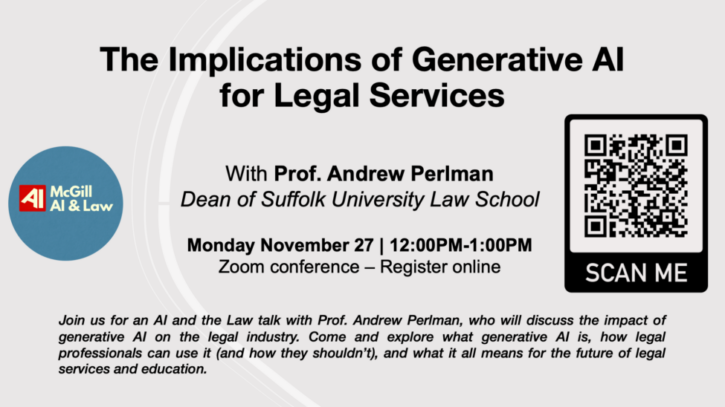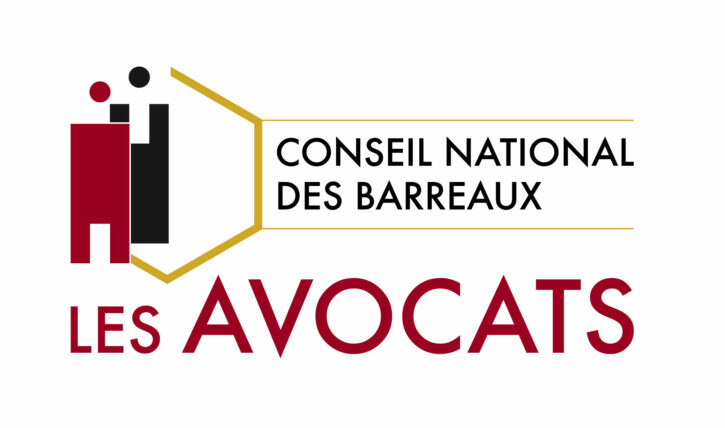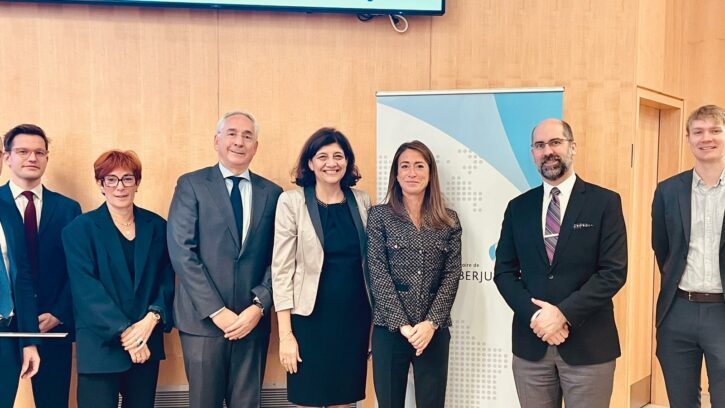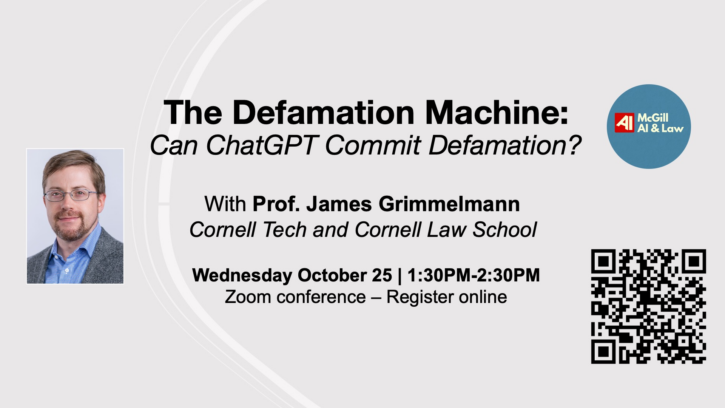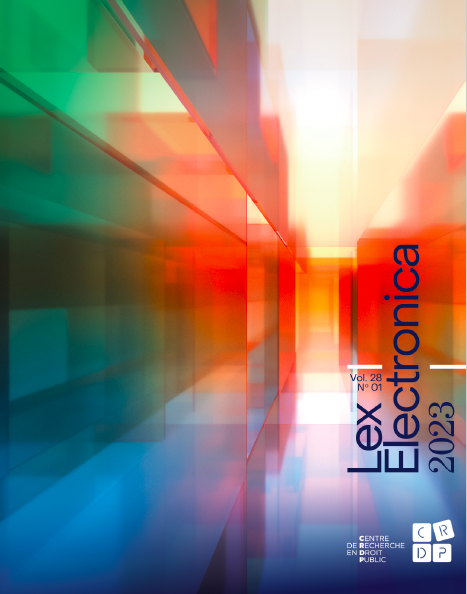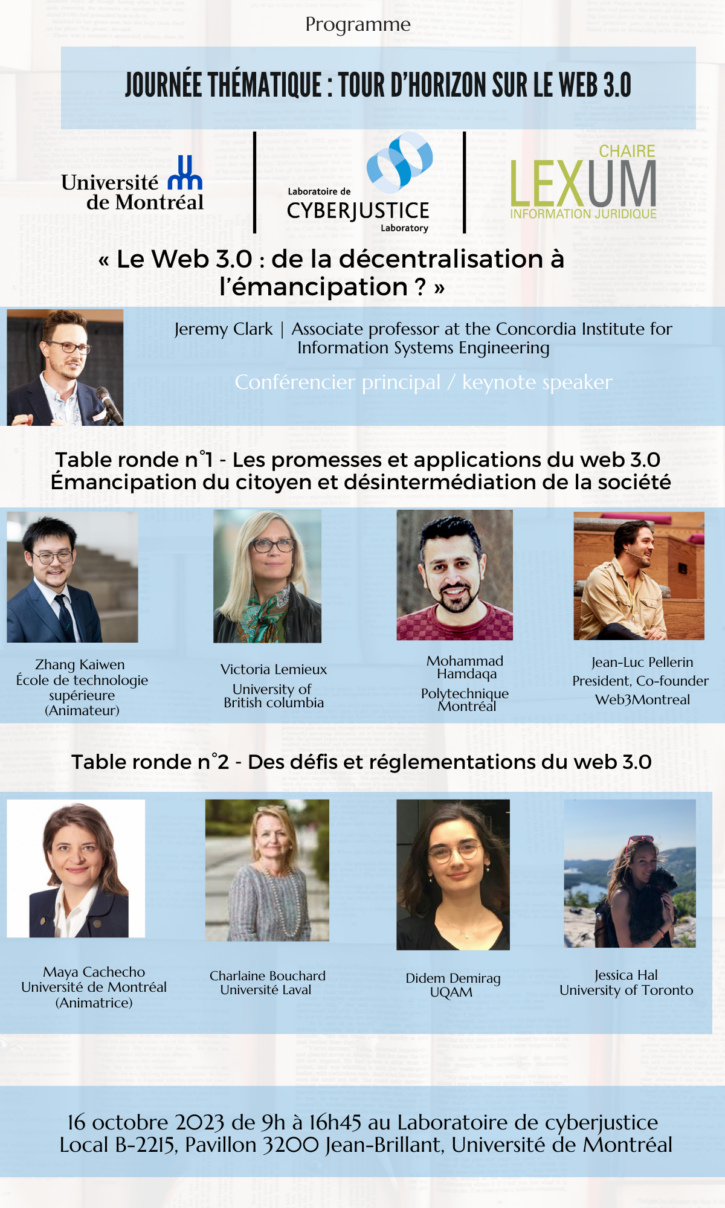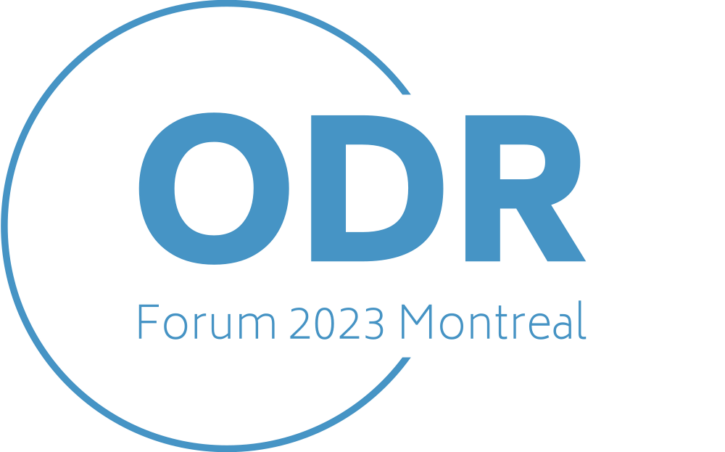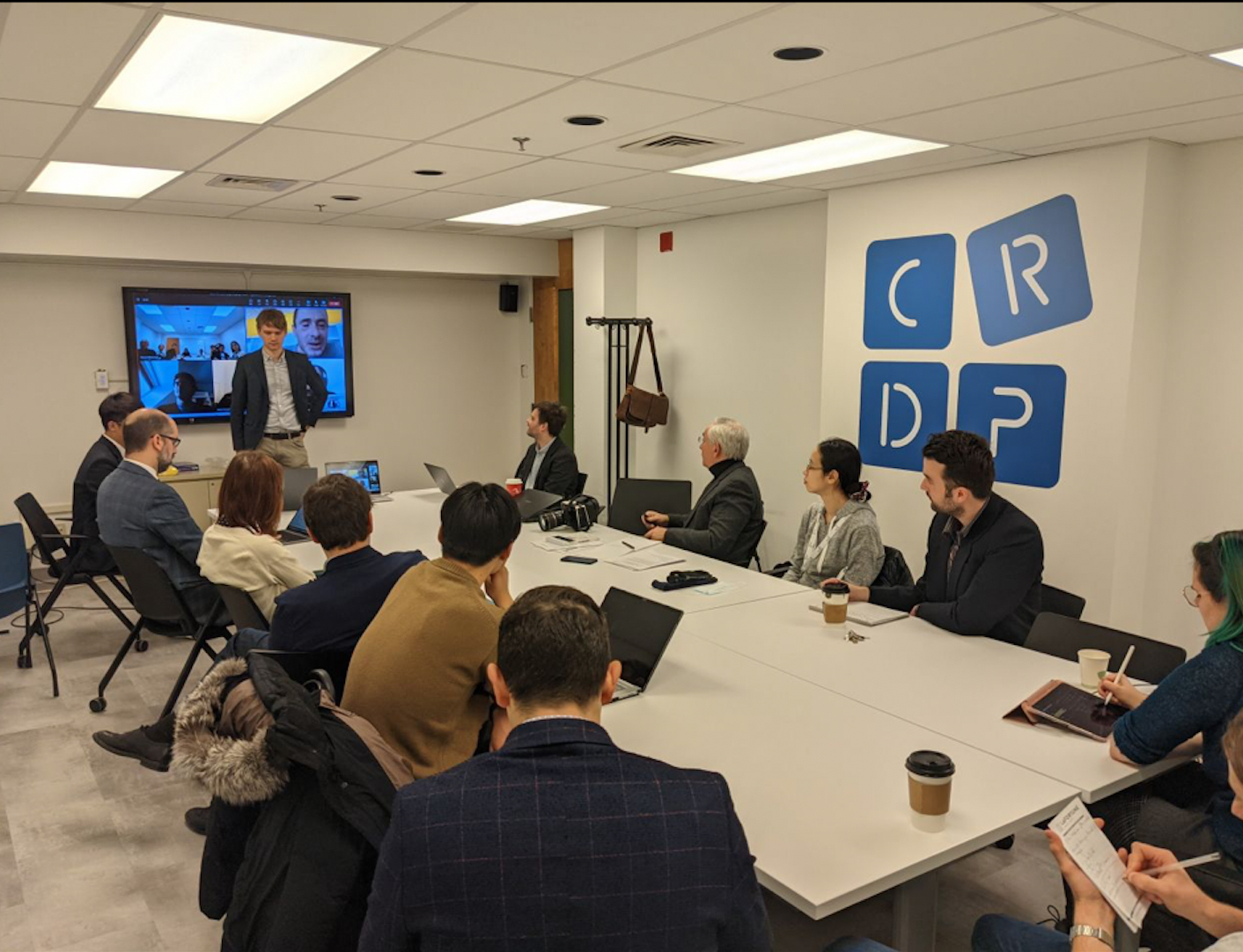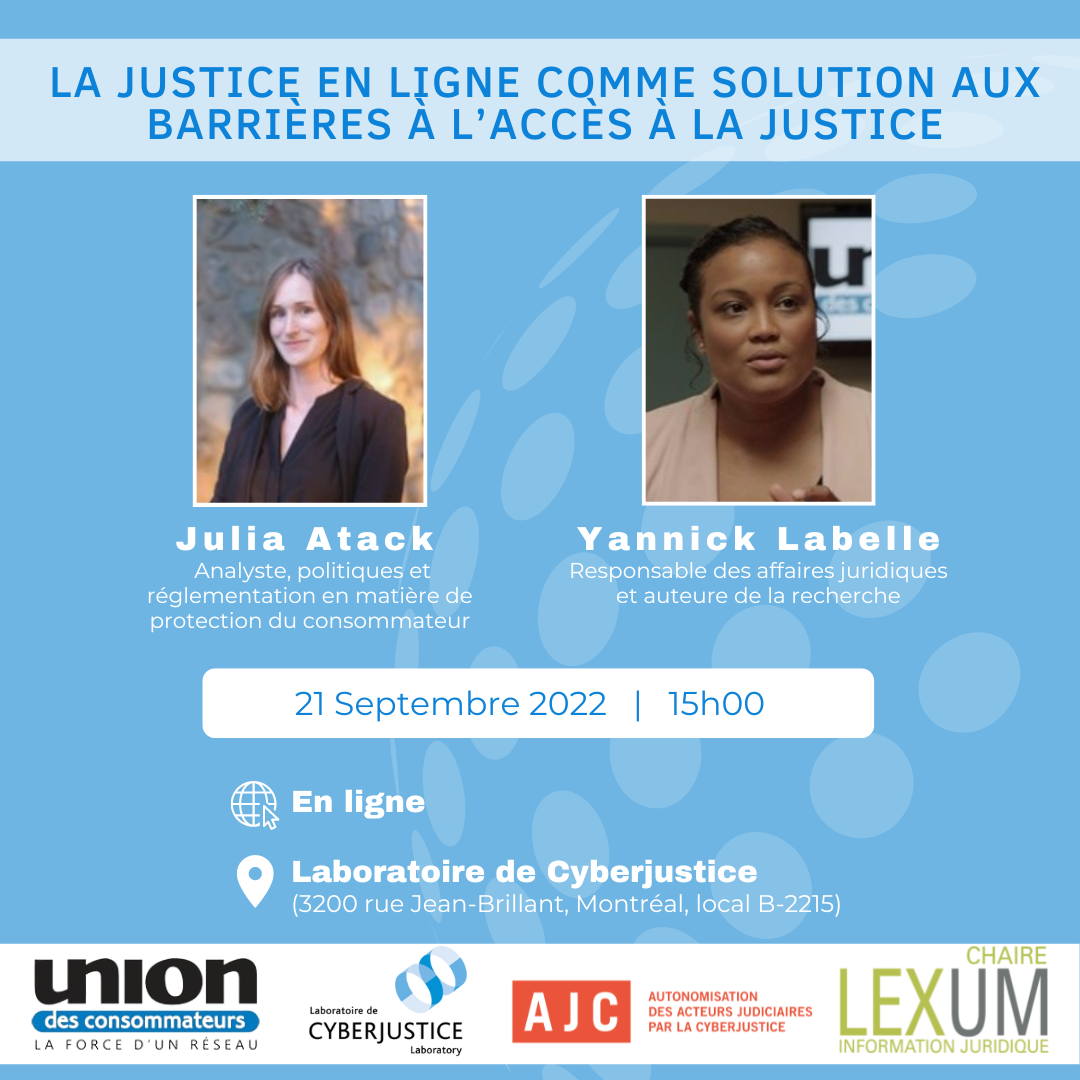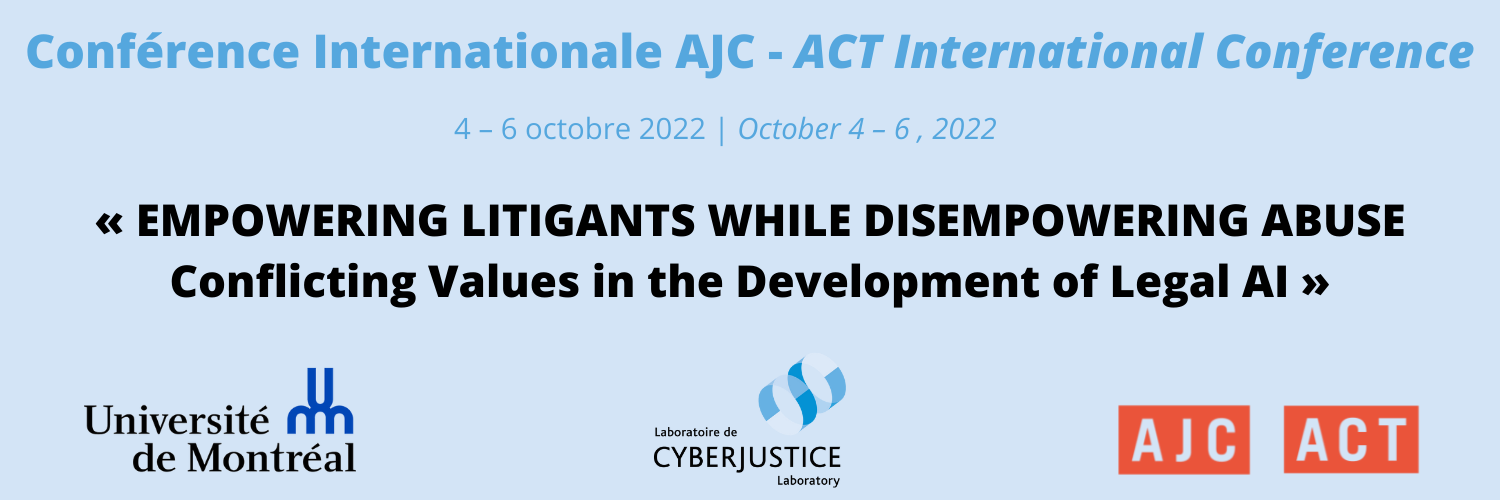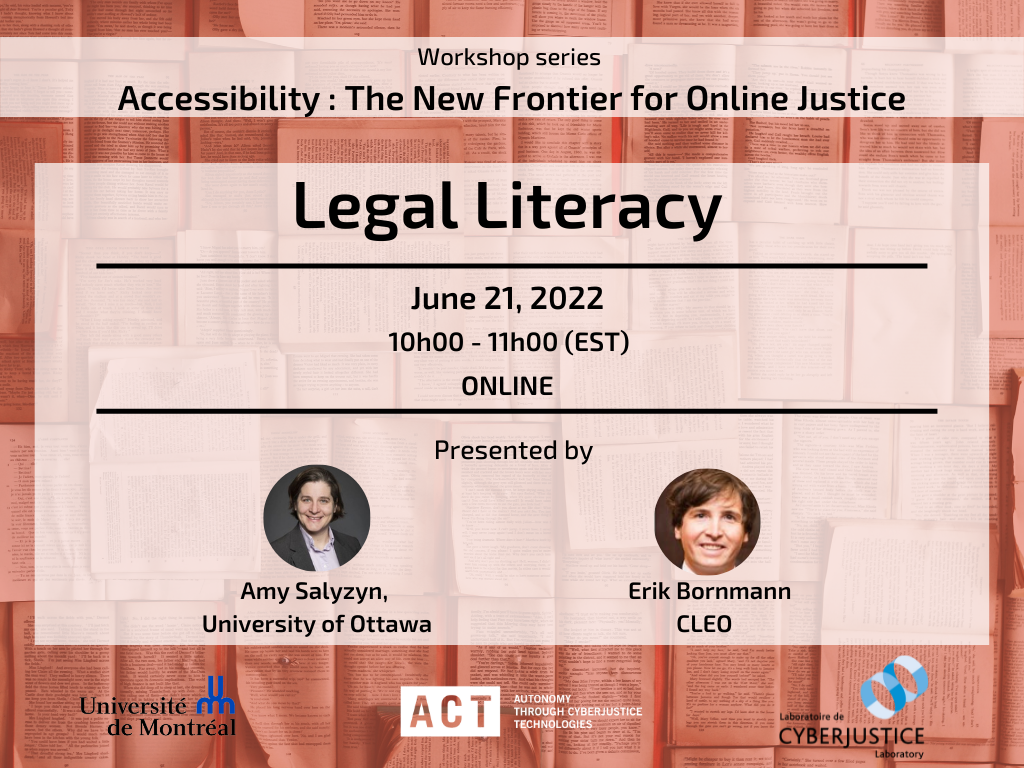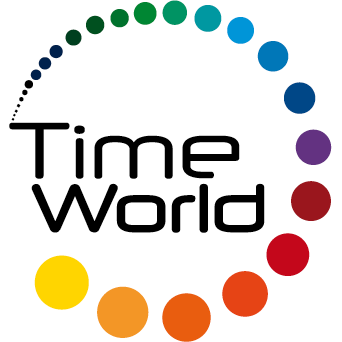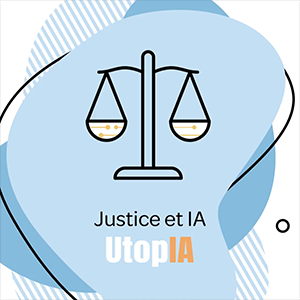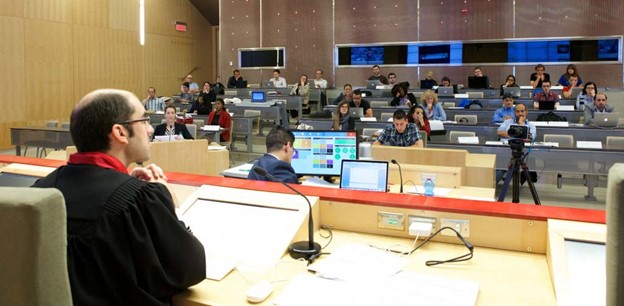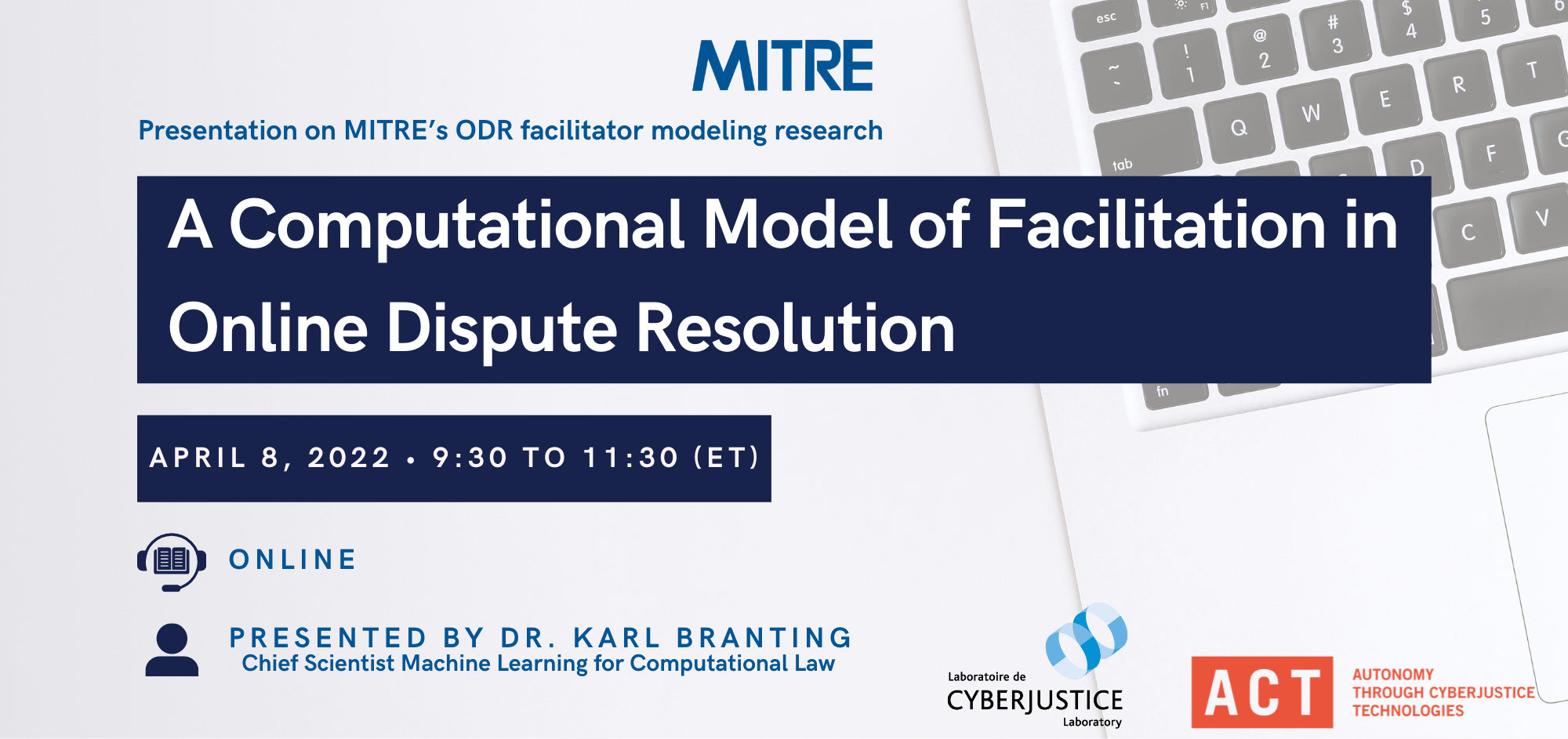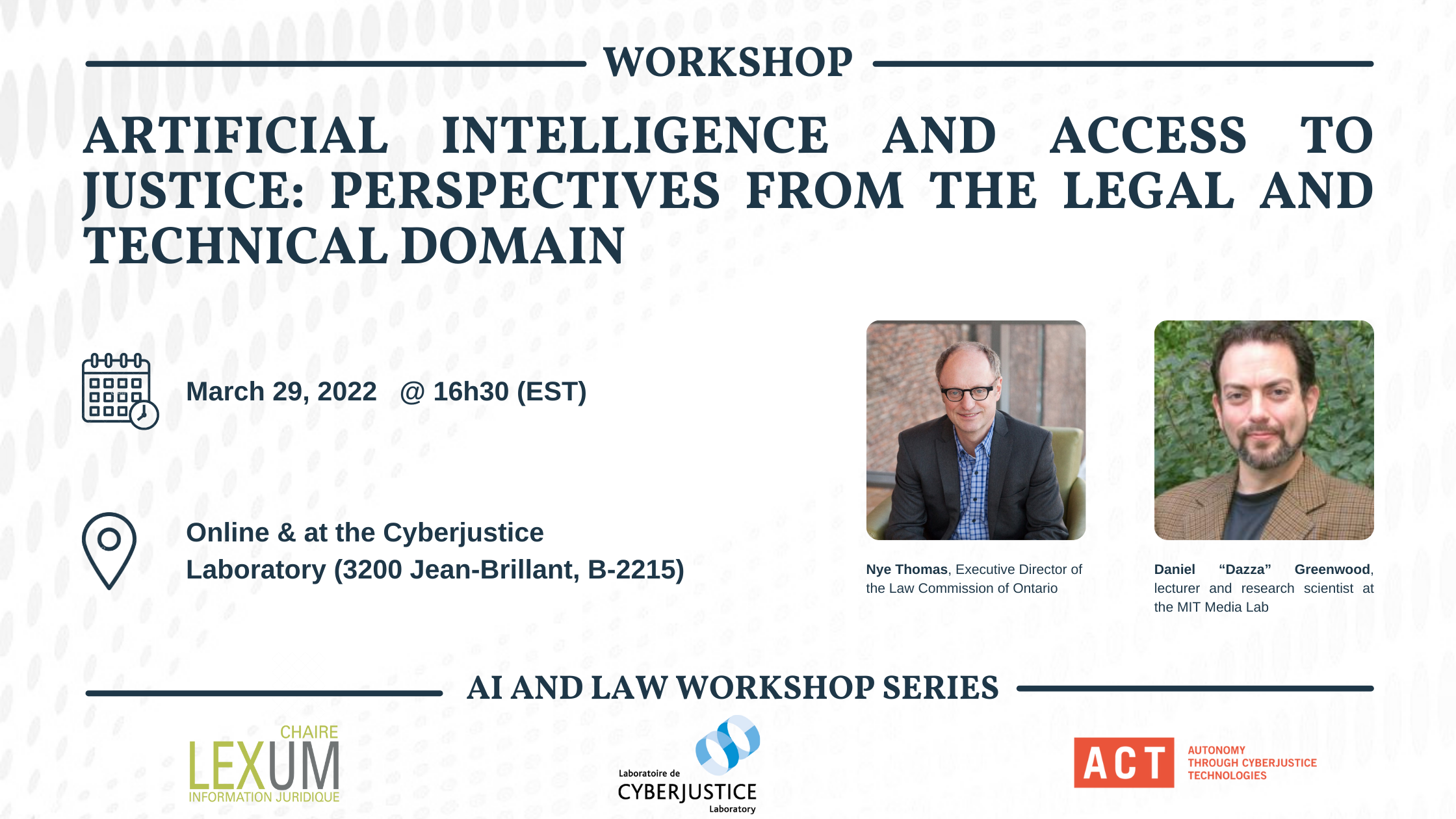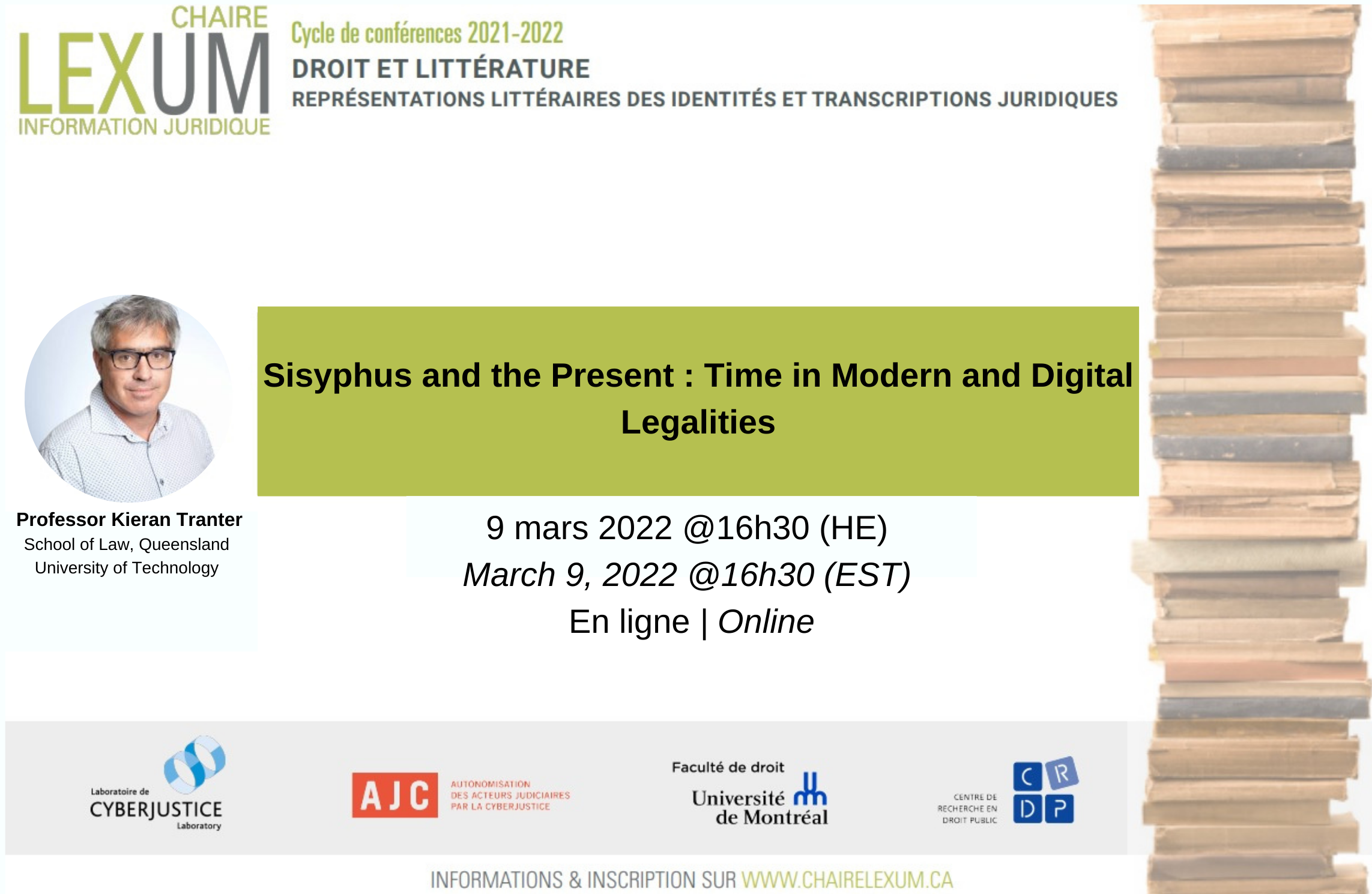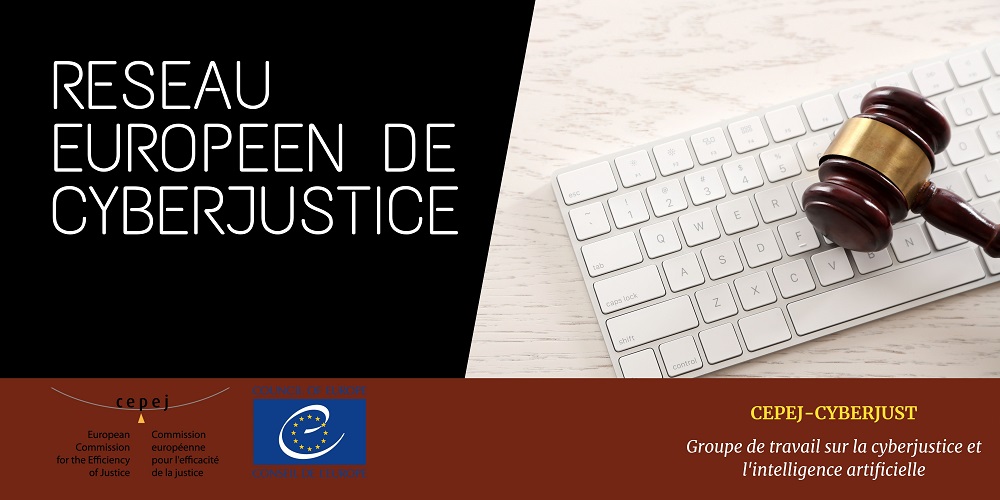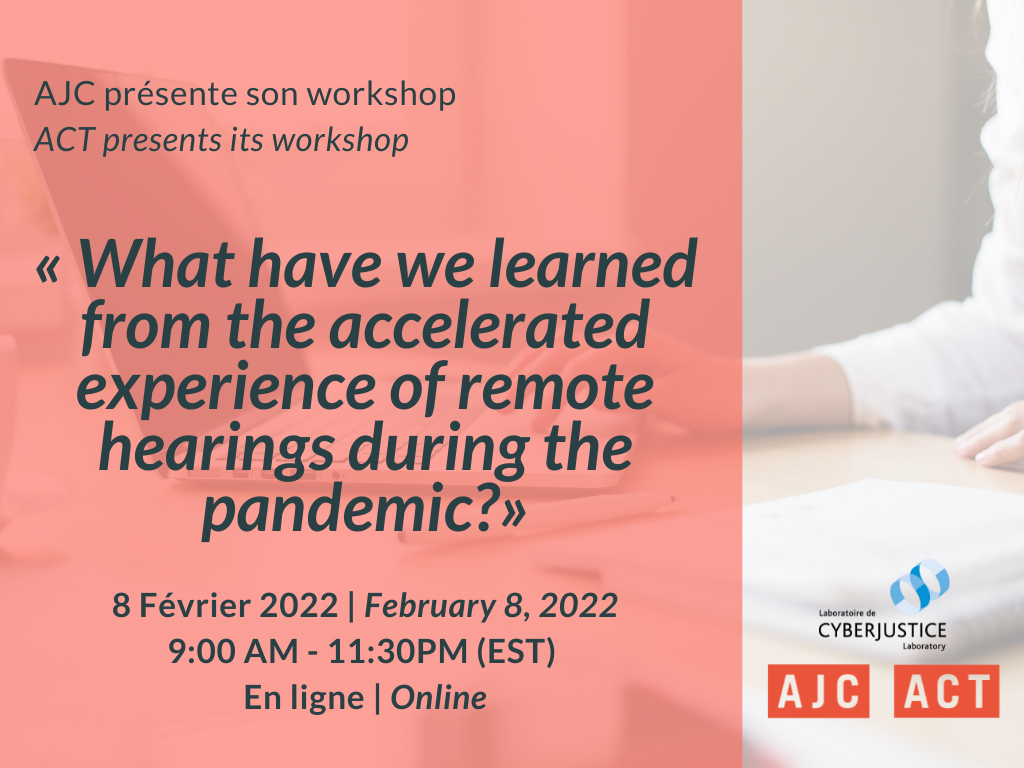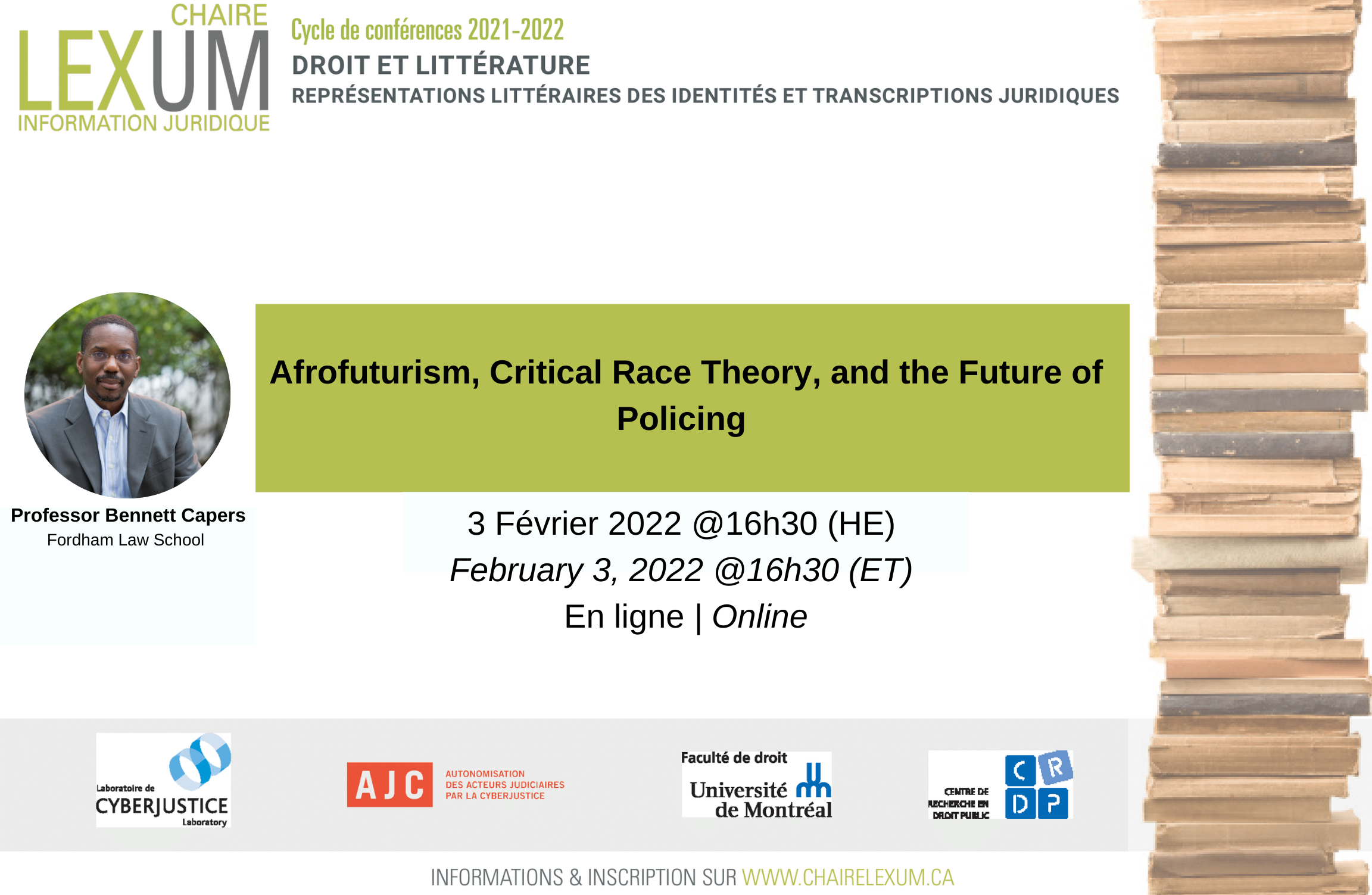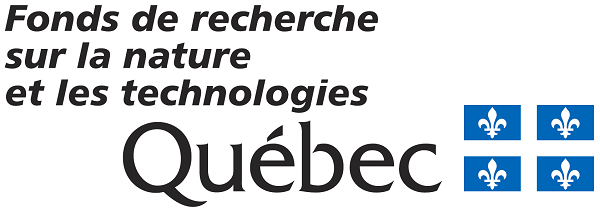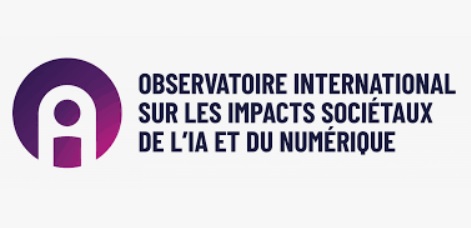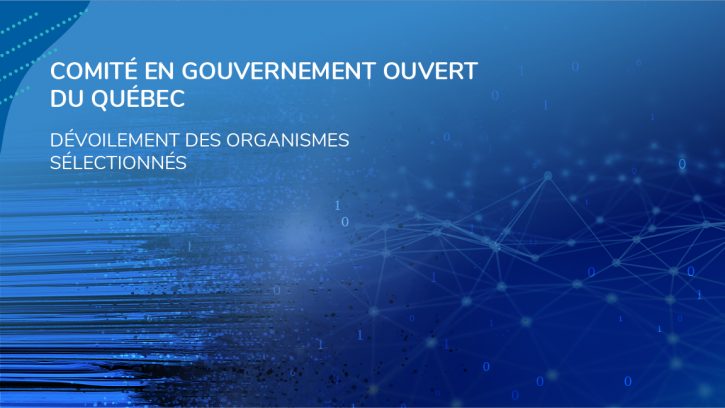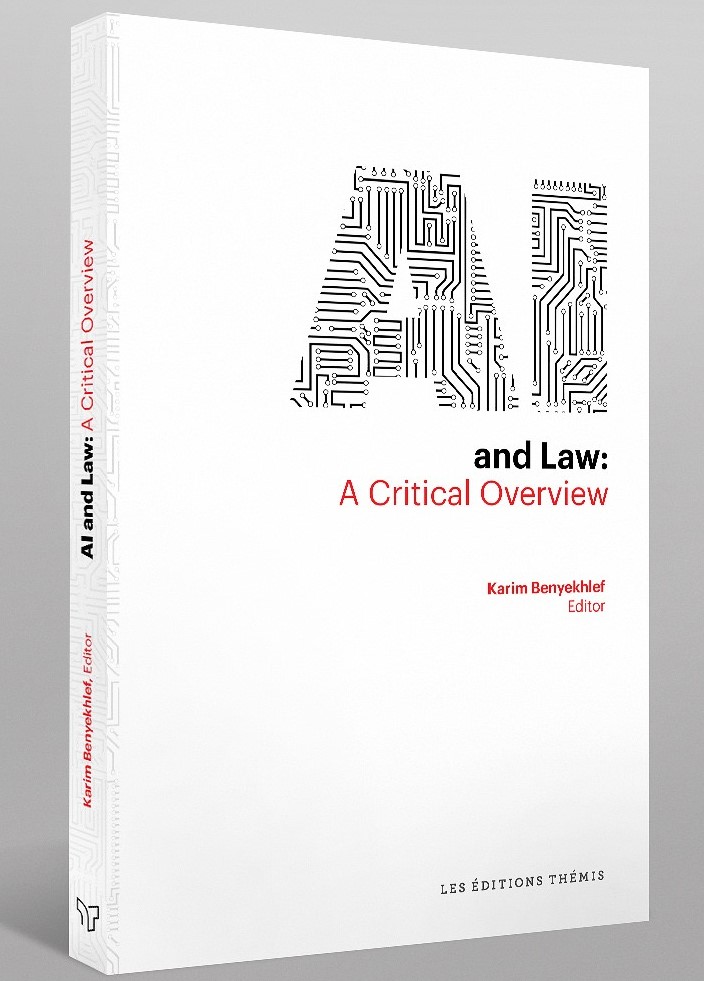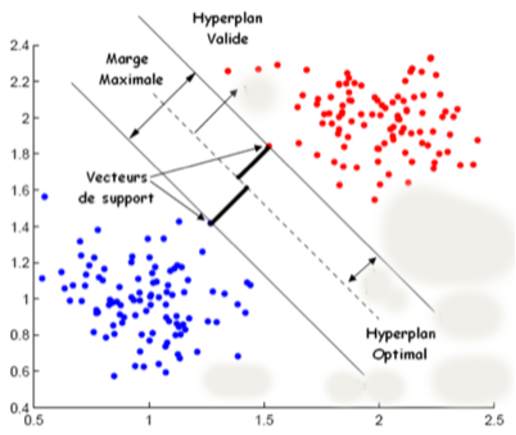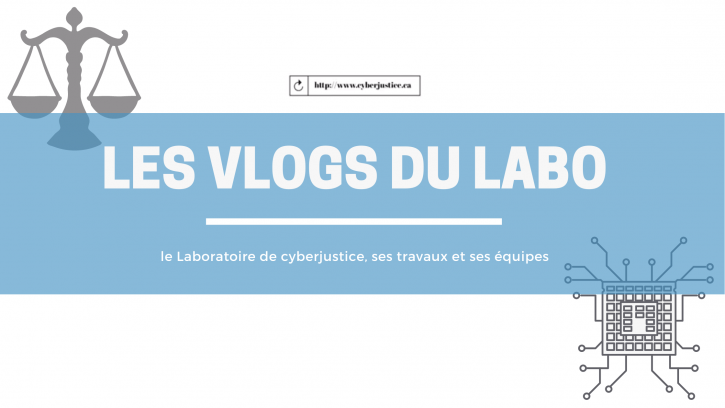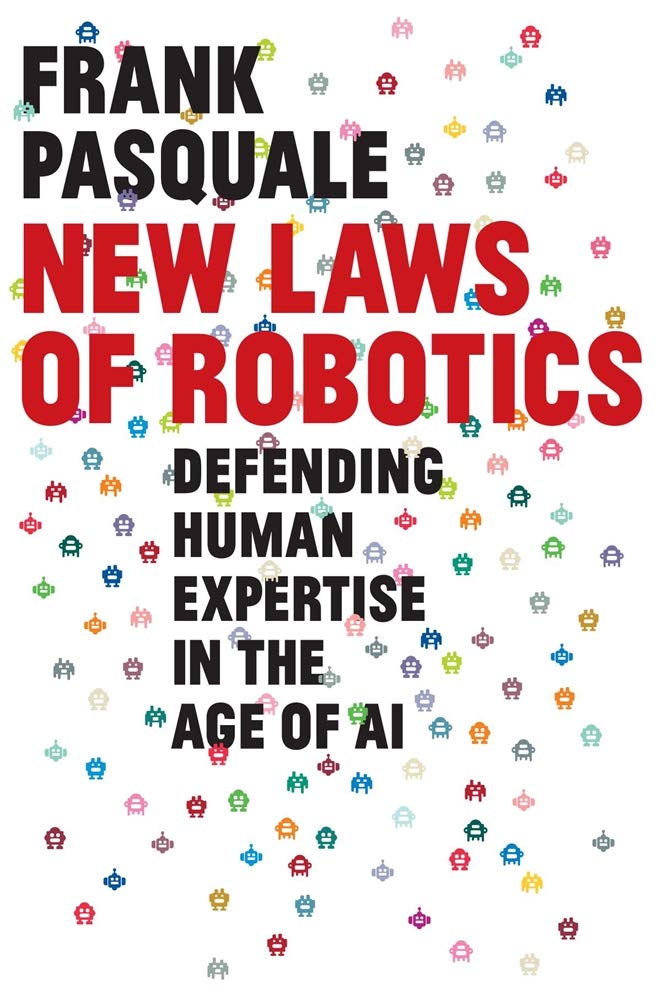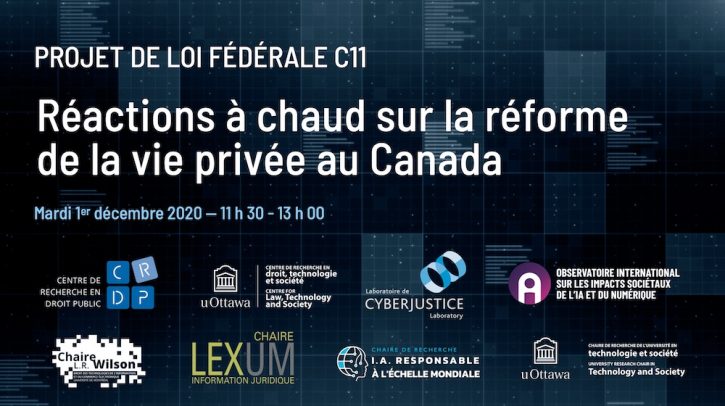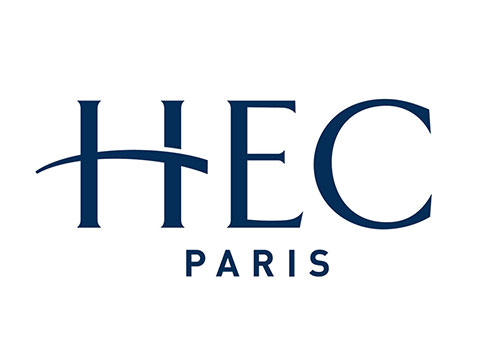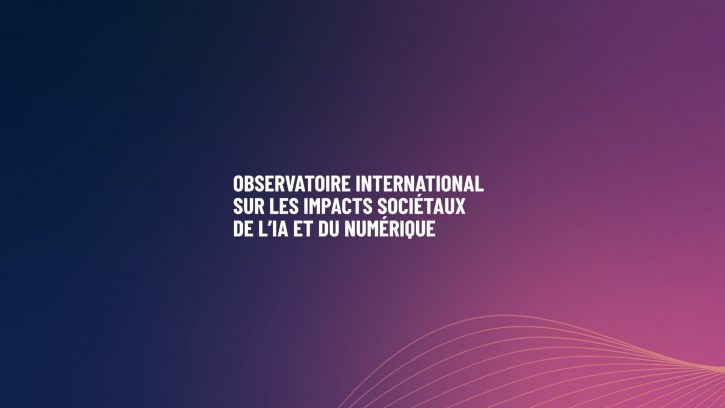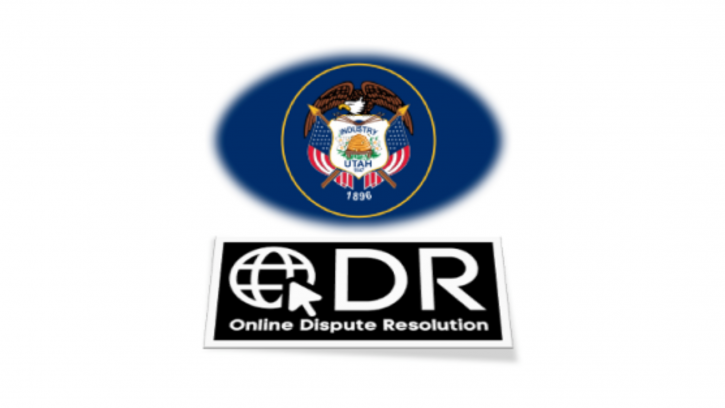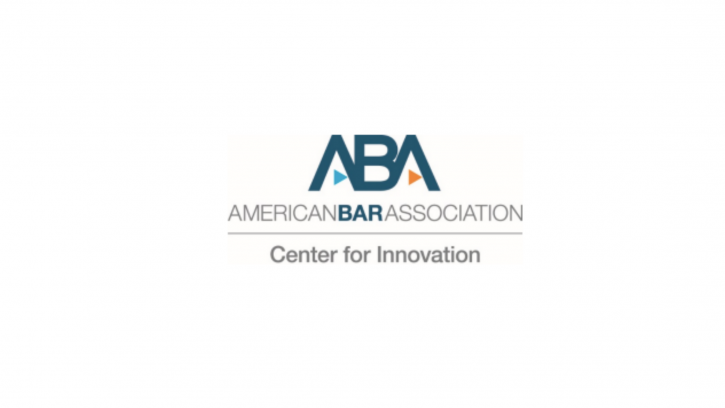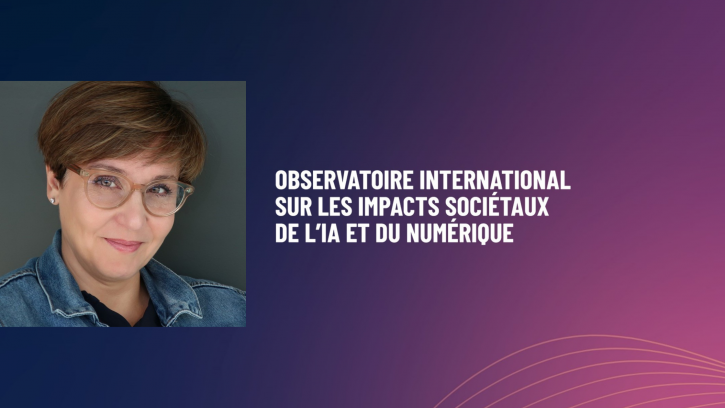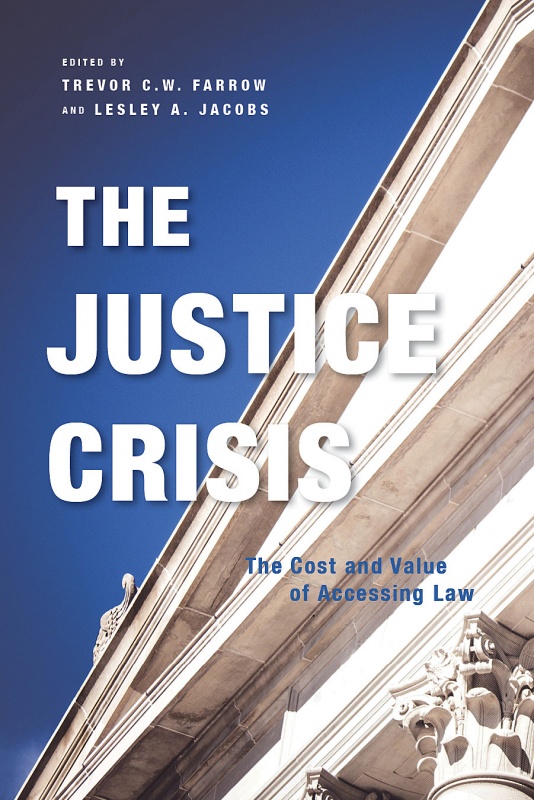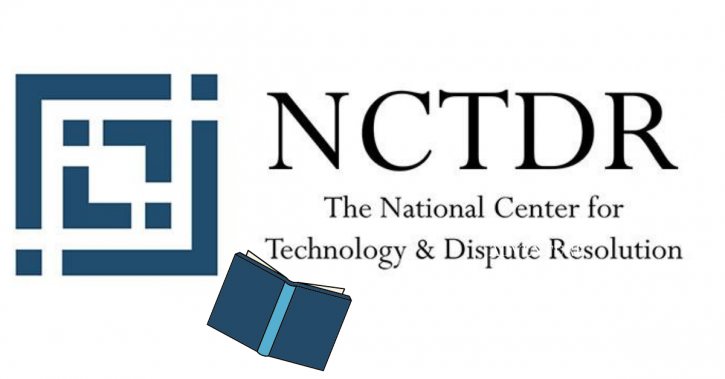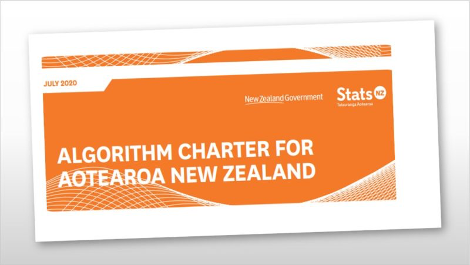News
À la une Actualités Dans les médias
La facture - Question of the week on PARLe consommation
The PARLe consommation platform is featured in the November 12, 2024 episode of Radio-Canada's “La facture”. The result of a research partnership with the Cyberjustice Laboratory, the negotiation and mediation platform, created in 2016 and operated by the Office de la protection du consommateur (OPC), is used by over 250 merchants. The average […] Read more
À la une Actualités Nouvelles
La plateforme PARLe consommation de l’OPC, un outil de plus en plus populaire
This content is not available in the selected language. La plateforme PARLe consommation est mentionnée dans l’article Régler son différend avec son concessionnaire automobile par la médiation de Mathieu Boulay, publié dans le Journal de Montréal (4 novembre 2024). Découlant d’un partenariat de recherche avec le Laboratoire de cyberjustice, la plateforme de négociation et […] Read more
À la une Actualités Nouvelles
Prof. Karim Benyekhlef et Mme Jie Zhu signent l’article « La géopolitique de l’intelligence artificielle : régulation et puissance » dans la revue Lex Electronica
This content is not available in the selected language. Le projet AJC a le plaisir de vous présenter l’article La géopolitique de l’intelligence artificielle : régulation et puissance de Prof. Karim Benyekhlef et Mme Jie Zhu dans la revue Lex Electronica, (2024) 29-1. Benyekhlef3-3Télécharger Citation recommandée Karim Benyekhlef et Jie Zhu, « La géopolitique de l’intelligence artificielle : […] Read more
À la une Actualités Dans les médias
Perspective of Prof. Karim Benyekhlef: "AI is not the panacea to translate court rulings"
Prof. Karim Benyekhlef shares his perspective on using AI to translate judicial decisions in the article "AI is not the panacea to translate court rulings" by Luis Millán, published in the Canadian Bar Association's "CBA National Magazine" This article explores the controversy surrounding the request to translate more than 6,000 Supreme Court of Canada decisions […] Read more
À la une Actualités Events
Discover the 'Montreal 2024, Generative AI and Justice' Conference Through Our Videos
The Cyberjustice Laboratory is pleased to invite you to the Montreal 2024: Generative AI and Justice conference, which will take place on October 1, 2024, at the laboratory. Practical Informations Venue : Cyberjustice Laboratory (B-2215), Jean-Brillant Building, 3200 Jean-Brillant Street, Montreal, Quebec, H3T 1N8 Date : 2024/10/01 from 9:00AM to 5:30PM Registration : Free but […] Read more
À la une Events
Conférence à venir : La justice à l’épreuve de l’IA. Lorsque l’intelligence artificielle casse les codes. (11 septembre 2024)
This content is not available in the selected language. Le Laboratoire de cyberjustice a le plaisir de vous inviter à la conférence La justice à l’épreuve de l’IA. Lorsque l’intelligence artificielle casse les codes. de Me Christiane Féral-Schuhl. Informations pratiques Quand : 11 septembre 2024 de 16:30 à 19:30 Où: Salon François-Chevrette, A-3464, Pavilion Maximilien-Caron, […] Read more
À la une Actualités
Upcoming conference: "Montreal 2024, Generative AI and Justice" (October 1, 2024)
The Cyberjustice Laboratory is pleased to invite you to the conference Montreal 2024, Generative AI and Justice, held on October 1, 2024, at the Laboratory. This conference is a unique opportunity for legal and justice players to better understand and position themselves on the emerging uses in several sectors of the use of generative […] Read more
À la une Actualités Dans les médias
Prof. Hannes Westermann, first speaker of the "AI & Access to Justice" webinars by the Stanford Legal Design Lab
The Cyberjustice Laboratory is pleased to announce that Prof. Hannes Westermann was the first speaker at the Stanford Legal Design Lab’s “AI & Access to Justice” webinars. In this inaugural webinar titled “Generative AI for Access to Justice: Challenges and Opportunities,” Prof. Westermann described generative AI as having significant potential to improve access to […] Read more
À la une Dans les médias
Regard de Prof. Karim Benyekhlef, “L’idée d’utiliser l’IA pour traduire les décisions de la Cour suprême fait débat”
This content is not available in the selected language. Prof. Karim Benyekhlef partage son regard sur l’utilisation de l’IA pour traduire les décisions dans l’article “L’idée d’utiliser l’IA pour traduire les décisions de la Cour suprême fait débat” de Lise Denis (Le Devoir, 7 juin 2024). Résumé Le juge en chef de la […] Read more
À la une Actualités Events
Video - Conference "AI and Public Legal Information & Education" by Me Rebecca Shur, Me Erik Bornmann & Mr. Jinzhe Tan
Above, you will find the conference "AI and Public Legal Information & Education" by Me Rebecca Shur (Éducaloi), Me Erik Bornmann (CLEO), and Mr. Jinzhe Tan (Cyberjustice Laboratory) as part of the 2024 conference series "AI, Large Language Models, and Justice: Considerations for Legal Practitioners, Judges, Law Schools, and Public Legal Educators." Speakers Biographies M. […] Read more
À la une Actualités Cyberjustice Web-Conferences
Vidéo – Conférence « L’IA générative dans le domaine juridique : une approche nuancée » (DL4T) de Prof. Karim Benyekhlef
This content is not available in the selected language. Vous trouverez ci-dessus la conférence L’IA générative dans le domaine juridique : une approche nuancée de Prof. Karim Benyekhlef, directeur du Laboratoire de cyberjustice, dans le cadre du projet Deep Law for Tech (DL4T) de l’Université Côte d’Azur. Le projet Deep Law for Tech (DL4T) a pour […] Read more
À la une Actualités Events
Upcoming Conference: AI and Public Legal Information & Education (May 16, 2024)
The Cyberjustice Laboratory is pleased to invite you to the online conference "AI and Public Legal Information & Education" featuring Me Rebecca Shur, Mr. Jinzhe Tan, and Mr. Erik Bornmann. Click here to register Practical Informations When : May 16, 2024, 12h30 Format : Zoom Speakers Biographies M. Jinzhe Tan Jinzhe Tan is […] Read more
À la une Actualités Events Nouvelles
Conférence à venir : “L’IA générative dans le domaine juridique : Une approche nuancée” de Pr Karim Benyekhlef (7 mai 2024)
This content is not available in the selected language. Le Laboratoire de cyberjustice a le plaisir de vous inviter à la conférence “L’IA générative dans le domaine juridique : Une approche nuancée” de Pr Karim Benyekhlef, directeur du Laboratoire de cyberjustice. Inscription https://my.weezevent.com/lia-generative-dans-le-domaine-juridique-une-approche-nuancee Informations pratiques Quand : 7 mai 2024, 12h00 (heure de Nice) […] Read more
À la une Actualités
Video – Conference 'The Use of Large Language Models and AI in Law Practice' by Professor Amy Salyzyn and Dr. Katie Szilagyi
Above, you will find the conference "The Use of Large Language Models and AI in Law Practice" by Prof. Amy Salyzyn (UOttawa) & Dr. Katie Szilagyi (University of Manitoba) as part of the 2024 conference series "AI, Large Language Models, and Justice Considerations for Legal Practitioners, Judges, Law Schools, and Public Legal Educators." Speakers […] Read more
À la une Actualités Events Nouvelles
Upcoming Conference: "AI and Judging" by Pre Tania Sourdin (May 7, 2024)
The Cyberjustice Laboratory is pleased to invite you to the online conference "AI and Judging" by Prof. Tania Sourdin. Click here to register Informations pratiques When : May 7th 2024, 4h30PM Format : Zoom Speaker's Biography Prof. Tania Sourdin is President of the Academic Senate at the University of Newcastle in Australia. She […] Read more
À la une Actualités
Rapport de recherche – “Le numérique et l’intelligence artificielle comme outil de justice sociale : les initiatives par et pour les groupes et communautés marginalisés”
This content is not available in the selected language. Le Laboratoire de cyberjustice a le plaisir de vous présenter le rapport de recherche intitulée Le numérique et l’intelligence artificielle comme outil de justice sociale : les initiatives par et pour les groupes et communautés marginalisés par Pre Karine Gentelet (UQO), membre du Laboratoire de cyberjustice et du […] Read more
À la une Actualités
Offre d’emploi | Étudiant.e en informatique aux cycles supérieurs
This content is not available in the selected language. Le Laboratoire de cyberjustice est un espace unique de réflexion et de création où les processus de justice sont modélisés et réimaginés afin d’améliorer l’accès à la justice. Nos travaux se distinguent par l’expérimentation d’innovations technologiques, comme l’intelligence artificielle, pour optimiser le fonctionnement actuel de la […] Read more
À la une Actualités Nouvelles
Offre d’emploi | 2 auxiliaires de recherche au Laboratoire de cyberjustice
This content is not available in the selected language. Le Laboratoire de cyberjustice est un espace unique de réflexion et de création où les processus de justice sont modélisés et réimaginés afin d’améliorer l’accès à la justice. Nos travaux se distinguent par l’expérimentation d’innovations technologiques, comme l’intelligence artificielle, pour optimiser le fonctionnement actuel de la […] Read more
À la une Actualités Nouvelles
Call for Applications - Doctoral Scholarships in Law and AI & Postdoctoral Fellowship in Law and Technology
The Cyberjustice Laboratory and the LexUM Chair in Legal Information offer an exceptional opportunity for doctoral students and postdoctoral researchers passionate about information technology, cyberjustice, and artificial intelligence. The LexUM Chair in Legal Information and Cyberjustice Laboratory Doctoral Fellowship is designed to encourage two young researchers to embark on an exciting thesis exploring the themes […] Read more
À la une Actualités Events Nouvelles
Conférence à venir: Colloque sur l’intelligence artificielle et le droit pénal « Des ordres et (désordres) de l’intelligence artificielle : Propagande – Pornographie – Profilage » (25 avril 2024)
This content is not available in the selected language. La Chaire Lexum et le Laboratoire de cyberjustice ont le plaisir de vous inviter au colloque sur l’intelligence artificielle et le droit pénal “Des ordres et (désordres) de l’intelligence artificielle : Propagande – Pornographie – Profilage. Cliquer ici pour vous inscrire Informations pratiques Où :Local […] Read more
À la une Actualités Dans les médias
Professor Paul Dumouchel publishes a critique of the essay
In this article, Paul Dumouchel reviews the essay "Not Quite Like Us? - Can Cyborgs and Intelligent Machines Be Natural Persons as a Matter of Law?" by Prof. Daniel J. Gervais of Vanderbilt University. Prof. Dumouchel questions the idea that artificial intelligence systems should be granted rights or legal personality, challenging the assumption underlying many […] Read more
À la une Actualités
Call for Applications - Doctoral Scholarships in Law and AI & Postdoctoral Fellowship in Law and Technology
The Cyberjustice Laboratory and the LexUM Chair in Legal Information offer an exceptional opportunity for doctoral students and postdoctoral researchers passionate about information technology, cyberjustice, and artificial intelligence. The LexUM Chair in Legal Information and Cyberjustice Laboratory Doctoral Fellowship is designed to encourage two young researchers to embark on an exciting thesis exploring the themes […] Read more
À la une Actualités Events
Upcoming Conference: "The Use of Large Language Models and AI in Law Practice" by Dr. Katie Szilagyi and Prof. Amy Salyzyn (April 18, 2024)
The Cyberjustice Laboratory is pleased to invite you to the online conference. "The Use of Large Language Models and AI in Law Practice" by Dr. Katie Szilagyi et Prof. Amy Salyzyn. Click here to register Practical Informations Quand : 18 avril 2024 (12:30) Où: Sur Zoom Speakers Biographies Prof. amy salyzyn Amy Salyzyn […] Read more
À la une Actualités Events
Conférence à venir: Colloque sur l’intelligence artificielle et le droit pénal “Des ordres et (désordres) de l’intelligence artificielle : Propagande – Pornographie – Profilage” (25 avril 2024)
This content is not available in the selected language. La Chaire Lexum et le Laboratoire de cyberjustice ont le plaisir de vous inviter au colloque sur l’intelligence artificielle et le droit pénal “Des ordres et (désordres) de l’intelligence artificielle : Propagande – Pornographie – Profilage. Cliquer ici pour vous inscrire Informations pratiques Où :Local […] Read more
À la une Actualités Dans les médias
Video - Conference "Large Language Models and Law Schools" by Prof. Jane Bailey, Prof. Wolfgang Alschner & Prof. Marina Pavlović
Above, you will find the conference "Large Language Models and Law Schools" by Prof. Jane Bailey (UOttawa), Prof. Wolfgang Alschner (UOttawa), and Prof. Marina Pavlović as part of the 2024 lecture series "AI, Large Language Models, and Justice Considerations for Legal Practitioners Judges, Law Schools, and Public Legal Educators." Speakers Biographies Prof. Marina pavlović […] Read more
À la une Actualités
Call for Applications - Doctoral Scholarships in Law and AI & Postdoctoral Fellowship in Law and Technology
The Cyberjustice Laboratory and the LexUM Chair in Legal Information offer an exceptional opportunity for doctoral students and postdoctoral researchers passionate about information technology, cyberjustice, and artificial intelligence. The LexUM Chair in Legal Information and Cyberjustice Laboratory Doctoral Fellowship is designed to encourage two young researchers to embark on an exciting thesis exploring the themes […] Read more
À la une Actualités
Appel à candidatures – Projet “Intelligence artificielle pour la découvrabilité”
This content is not available in the selected language. POSTE : Étudiant en droit des nouvelles technologies Le Laboratoire de cyberjustice est un espace unique de réflexion et de création où les processus de justice sont modélisés et réimaginés afin d’améliorer l’accès à la justice. Nos travaux se distinguent par l’expérimentation d’innovations technologiques, comme l’intelligence artificielle, […] Read more
À la une Actualités Cyberjustice Web-Conferences
Upcoming Conference: (Free)lance Content and Generative AI: The Persisting Plight of Freelance Authors Across the Creative Industries by Dr. Pina D'Agostino (April 9, 2024)
date April 9th, 2024, 13h00 zoom registration https://mcgill.zoom.us/meeting/register/tZEqcOyppzguHd3ddDeKt5Ylo5x5BS9dDBLq Summary Recycling existing copyright-protected works in new media is an age-old recurrence, which continues to challenge copyright law and its future on a global scale. Each time a new technology enjoys wide-spread adoption there is a new way to re-introduce or recycle an existing […] Read more
À la une Actualités Conferences and seminars
Conférence à venir: Colloque sur l’intelligence artificielle et le droit pénal “Des ordres et (désordres) de l’intelligence artificielle : Propagande – Pornographie – Profilage” (25 avril 2024)
This content is not available in the selected language. La Chaire Lexum et le Laboratoire de cyberjustice ont le plaisir de vous inviter au colloque sur l’intelligence artificielle et le droit pénal “Des ordres et (désordres) de l’intelligence artificielle : Propagande – Pornographie – Profilage. Cliquer ici pour vous inscrire Informations pratiques Où :Local […] Read more
À la une Actualités
Upcoming Conference: "Large Language Models and Law Schools" by Prof. Marina Pavlović, Prof. Wolfgang Alschner, and Prof. Jane Bailey (March 27, 2024)
The Cyberjustice Laboratory is pleased to invite you to the online conference "Large Language Models and Law Schools" by Prof. Marina Pavlović, Prof. Wolfgang Alschner et Prof. Jane Bailey. Click here to register Informations pratiques When : March 27th, 2024, 12h30 Format : On Zoom Speakers Biography Prof. Marina pavlović Professor Pavlovic […] Read more
À la une Actualités
Call for Applications - Doctoral Scholarships in Law and AI & Postdoctoral Fellowship in Law and Technology
The Cyberjustice Laboratory and the LexUM Chair in Legal Information offer an exceptional opportunity for doctoral students and postdoctoral researchers passionate about information technology, cyberjustice, and artificial intelligence. The LexUM Chair in Legal Information and Cyberjustice Laboratory Doctoral Fellowship is designed to encourage two young researchers to embark on an exciting thesis exploring the themes […] Read more
À la une Actualités
Video – Conference "Understanding Large Language Models" by Prof. Mark Daley
Above, you will find the conference "Understanding Large Language Models" by Prof. Mark Daley (Western University) as part of the 2024 lecture series "AI, Large Language Models, and Justice Considerations for Legal Practitioners, Judges, Law Schools, and Public Legal Educators." Speaker's Biography Mark is the Chief AI Officer at Western University and a full professor […] Read more
À la une Events
Upcoming Conference: Understanding Large Language Models by Dr. Mark Daley (March 18, 2024)
The Cyberjustice Laboratory is pleased to invite you to the online conference "Understanding Large Language Models" by Dr. Mark Daley. Cliquer ici pour vous inscrire Practical Information When : March 18th 2024, 11h30 Format : On Zoom Speaker's Biography Mark is the Chief AI Officer at Western University and a full professor in the Department […] Read more
À la une
Appel à candidatures – Bourses doctorales Droit et IA & stage postdoctoral en droit et technologie
This content is not available in the selected language. Le Laboratoire de cyberjustice et la Chaire LexUM en information juridique offre une opportunité exceptionnelle pour les étudiants de doctorat et les chercheurs postdoctoraux passionné.es par les technologies de l’information, la cyberjustice et l’intelligence artificielle. La Bourse doctorale de la Chaire LexUM en information juridique et […] Read more
À la une Actualités
Meeting of the Cyberjustice Laboratory Team: Advances and Features of the LLMediator Project
The Cyberjustice Laboratory's team met this afternoon to discuss the LLMediator project, a conversational agent facilitating online mediation procedures. Several features were presented, such as detecting inflammatory messages, the ability to propose a reformulation of these messages, as well as the possibility of asking the conversational agent to summarize previous messages on the LLMediator platform. […] Read more
À la une
Call for Papers: 'Can Artificial Intelligence Contribute to Justice?' Conference
The-International-Association-of-Law-2Télécharger Read more
À la une Actualités
Upcoming conference: Symposium "Problematic Generative AI" (February 9, 2024)
The Cyberjustice Laboratory invites you to the "Problematic Generative AI" symposium. Organized in collaboration with the Center for Legal & Court Technology and the Commonwealth Cyber Initiative, this event will be held on February 9, 2024. This symposium is a follow-up to the discussion that began at the 2023 Problem AI symposium. We strongly […] Read more
À la une Actualités Dans les médias
Professor Karim Benyekhlef and Mr. Gabriel Lefebvre sign the article "Predictive Policing in Canada" in the International Review of Criminal Law
On January 9, 2024, the Revue Internationale de Droit Pénal published volume 94, number 2. This issue of RIDP, entitled "Artificial Intelligence and Administration of Criminal Justice" presents the results of collective research undertaken in 2020. Based on a lengthy questionnaire, this research addresses emerging issues concerning the use of artificial intelligence (AI), primarily machine […] Read more
À la une Actualités
The Cyberjustice Laboratory collaborates with the OECD on the report "Developing effective online dispute resolution in Latvia"
Today, the OECD published its report titled "Developing Effective Online Dispute Resolution in Latvia." The report documents the evaluation of online dispute resolution in Latvia and summarizes key policy recommendations to support its development. It draws inspiration from the OECD's previous influential work on access to justice, such as the OECD Recommendations on Access to […] Read more
À la une Actualités
Job offer | Research assistant.s at the Cyberjustice Laboratory
The Cyberjustice Laboratory is a unique space for reflection and creation, where justice processes are modeled and reimagined to improve access to justice. Our work is characterized by the experimentation of technological innovations, such as artificial intelligence, to optimize the current functioning of justice, so as to increase efficiency, reduce costs and delays, and simplify […] Read more
À la une LexUM Chair Conferences
Conférence à venir : IA, enjeux de pouvoir, de puissance et de souveraineté dans un monde en transition de Dre Asma Mhalla (4 décembre 2023)
This content is not available in the selected language. La Chaire Lexum et le Centre de recherche en droit public ont le plaisir de vous inviter à la conférence “IA, enjeux de pouvoir, de puissance et de souveraineté dans un monde en transition” de Dre Asma Mhalla. Cliquer ici pour vous inscrire Informations pratiques Quand : […] Read more
À la une Conferences and seminars
La Conférence Cyberjustice Europe 2023 en images
This content is not available in the selected language. La conférence Cyberjustice Europe 2023 a été un succès, et nous souhaitons exprimer nos remerciements à l’équipe de l’Institut des Études et de la Recherche sur le Droit et la Justice, ainsi qu’au Conseil de l’Europe, avec qui nous avons collaboré pour organiser cet événement. Cette […] Read more
À la une Actualités
Publication à venir (15 novembre 2023) – Les intelligences artificielles au prisme de la justice sociale – Considering Artificial Intelligence Through the Lens of Social Justice
This content is not available in the selected language. Le livre “Les intelligences artificielles au prisme de la justice sociale – Considering Artificial Intelligence Through the Lens of Social Justice” sous la direction de Pre Karine Gentelet sera publiée le 15 novembre 2023 par PUL (Presses de l’Université Laval). Cet ouvrage vient clôturer deux années […] Read more
À la une
Conférence McGill AI & Law – The Implications of Generative AI for Legal Services
6 November 2023 Fabien Gélinas
This content is not available in the selected language. When: Monday, November 27th, 2023 – 12:00 – 13:00 Where: Online Price: Free Zoom Registration: https://mcgill.zoom.us/meeting/register/tZ0sf–trzouE9bfkVDT50tCJ056QeMo665K Abstract: This talk will discuss the impact of generative AI on the legal industry. It will include a description of what generative AI is, how legal professionals can use it […] Read more
À la une Actualités Nouvelles
La Commission d’Accès à l’Information répond au mémoire du Laboratoire de Cyberjustice portant sur ses lignes directrices
This content is not available in the selected language. En mai dernier, la Commission d’Accès à l’Information (CAI) avait lancé une consultation publique sur son projet de lignes directrices sur les critères de validité du consentement, en réaction à l’entrée en vigueur progressive des dispositions de la Loi 25 sur la protection des renseignements personnels. […] Read more
À la une
Subproject 11 Report - Participation of marginalized and/or under-represented groups: Guide to supporting the inclusion of their needs and values
30 October 2023 Karine Gentelet
his report written by Pre Karine Gentelet (UQO), Ms Marie Zumstein & Ms Lily-Cannelle Mathieu aims to detail the reasons why tensions may arise when deploying an AI tool dedicated to access to justice for marginalized populations. A summary of initiatives already implemented on themes surrounding social justice issues has thus enabled the sub-project 11 […] Read more
À la une Actualités
Rapport du Conseil national des barreaux sur le legal tech du domaine de la jurimétrie
This content is not available in the selected language. Avec plaisir, nous vous partageons le rapport du groupe de travail Legaltech du Conseil national des barreaux sur la legal tech dans le domaine de la jurimétrie. Ce rapport a pour objectif d’établir une cartographie des différentes Legaltechs œuvrant dans le domaine de la “Justice prédictive” […] Read more
À la une Events
Visite de la délégation du Conseil national des barreaux et du cabinet d’avocats FÉRAL au Laboratoire de cyberjustice
We were delighted to welcome the delegation from the Conseil national des barreaux and the FÉRAL law firm team to our laboratory. Our guests had the opportunity to attend presentations on our online dispute resolution platform, PARLe, the JusticeBot, as well as on our current project, LLMediator, aimed at integrating artificial intelligence and Large Language […] Read more
À la une Dans les médias
La facture – Passez le mot sur Justicebot.ca
This content is not available in the selected language. La plateforme JusticeBot est mentionnée dans l’épisode de l’émission de Radio-Canada “La facture” du 24 octobre 2023. JusticeBot est un outil informatique utilisant l’intelligence artificielle (IA) pour simplifier l’accès du public à l’information juridique. Actuellement, son développement est axé sur les conflits entre propriétaires et locataires, […] Read more
À la une Conferences and seminars
Conférence McGill AI & Law – The Defamation Machine : Can ChatGPT Commit Defamation ?
18 October 2023 Fabien Gélinas
This content is not available in the selected language. When: Wednesday, October 25, 2023 13:30 to 14:30 Where : Online Price: Free Zoom Registration: https://mcgill.zoom.us/meeting/register/tZcsd-6hqTMsGdUvpnw_oZyk_oI_M1Y8uatP Join us for an AI and the Law talk with Prof. James Grimmelmann, who will explore the question of software interpretation and revisit some of the classic thought experiments about artificial intelligence from a lawyerly point […] Read more
À la une Actualités
From Wetware to Robots to Airware: Imagining a Trajectory for AI-facilitated Justice
Alexis Leblanc-Roy 20 September 2023
This content is not available in the selected language. This installation is intended to interrogate the involvement of AI in the justice system. Your comments, if you choose to make any, will help us understand how the public feels about the possibility of AI judges, substantive vs. procedural reasons, and adjudicative vs. predictive justice systems. […] Read more
À la une Actualités
Un robot répondra à vos questions en matière de consommation et de vie privée
The article "Un robot répondra vos questions en matière de consommation et de vie privée" by Virginie Soffer, published on the "UdeMNouvelles" website, discusses the Cyberjustice Laboratory's JusticeBot project. JusticeBot is an interactive conversational agent that uses artificial intelligence to simplify access to legal information for the general public. Since July 2020, JusticeBot has been […] Read more
À la une Actualités
De la garantie de qualité à l’obsolescence programmée. Étude empirique sur les cas de bris de produits portés devant la Cour des petites créances
This content is not available in the selected language. Télécharger le fichier PDF Nous avons le plaisir de vous présenter l’article “De la garantie de qualité à l’obsolescence programmée. Étude empirique sur les cas de bris de produits portés devant la Cour des petites créances”, co-écrit par Pierre-Emmanuel Moyse, Billie Godbout & Katherine Beaulieu dans la […] Read more
À la une Actualités LexUM Chair Conferences Conferences and seminars Nouvelles
Le Web 3.0 : de la décentralisation à l’émancipation ?
“Agriculture destroyed the chief, forcing a transition to oligarchy. Industrialization destroyed the king, forcing a transition to democracy. The information revolution, coupled with globalization, is eroding representative government and forcing a transition toward something completely new." Michael Mason et Matthew Spoke, "Programmable Trust" Succeeding to the first-generation encyclopedic web and the social or participatory web, […] Read more
À la une Conferences and seminars
ODR FORUM MONTREAL 2023 |The State and Future of ODR
This content is not available in the selected language. The International Forum is heading to Canada. The 23rd International ODR Forum will be held at the Cyberjustice Laboratory of the Université de Montréal on October 11-12, 2023. The 23rd International ODR Forum is a two-day assembly of over 250 innovators, changemakers and thought leaders from various sectors, such as business, […] Read more
À la une Actualités Nouvelles
Faire de la médiation avec ChatGPT
This content is not available in the selected language. Le Laboratoire de cyberjustice travaille à la mise en place d’un robot conversationnel qui soutiendrait les intervenants de la médiation et ses usagers. Vous vous séparez. Votre partenaire veut obtenir la garde des enfants. Comme vous. Vous consultez alors un médiateur pour régler cette situation à […] Read more
À la une Actualités Blog
La Loi sur les nouvelles en ligne au Canada : une partie de ping pong ou l’épée de Damoclès ?
This content is not available in the selected language. Par Jie Zhu, Candidate au doctorat en droit à l’Université de MontréalAuxiliaire de recherche au Laboratoire de cyberjustice Le projet de loi C-18, sanctionné le 22 juin 2023, a récemment fait les manchettes de différents journaux; et plusieurs d’entre nous avons reçu nombre d’alertes et autres […] Read more
À la une Actualités Events
ODR Forum Montreal 2023| Call for contributions
This content is not available in the selected language. International ODR Forum 2023, October 11th & 12th Download Read more
À la une Blog
La Chine annonce avoir développé une intelligence artificielle capable de remplacer les juges
This content is not available in the selected language. Par Rémi Slama – auxiliaire de recherche au Laboratoire de cyberjustice Des chercheurs du domaine de l’intelligence artificielle (« IA ») appartenant au parquet de Shanghai (district de Pudong) ont récemment annoncé avoir mis au point une IA capable de remplacer un procureur dans sa fonction d’autorité de poursuite d’une […] Read more
À la une Actualités
Rapport sur l’épistémologie de l’intelligence artificielle (IA
21 June 2023 Hannes Westermann / Jie Zhu / Sébastien Meeùs
This content is not available in the selected language. Nous avons le plaisir de vous présenter le “Rapport sur l’épistémologie de l’intelligence artificielle (IA)” rédigé par Ilona BOIS-DRIVET, Hannes WESTERMANN, Jie ZHU, Justin-Éric BOILEAU et Sébastien MEEÙS. Télécharger ici Read more
À la une Actualités
Lunch and Learn: Large Language Models – Applications in the legal field
This content is not available in the selected language. Le mercredi, 8 février dernier a eu lieu le Lunch and Learn: Large Language Models – Applications in the legal field où l’équipe du Laboratoire a eu l’occasion de participer à une séance de brainstorming sur l’utilisation de ChatGPT dans le domaine juridique avec des contributions de Karim […] Read more
Actualités
À l’invitation du ministère de la Justice du Canada, le Pr. Karim Benyekhlef et Me Valentin Callipel représenteront le Canada dans le cadre du dialogue Canada-Europe sur la numérisation de la justice
This content is not available in the selected language. Karim Benyekhlef, directeur du Laboratoire de cyberjustice, et Valentin Callipel, chargé de mission, rencontreront des experts européens et canadiens dans le cadre d’une discussion portant sur l’échange des meilleures pratiques en matière de numérisation de la justice. Le dialogue portera, plus précisément, sur les initiatives canadiennes […] Read more
À la une Nouvelles
ACT researcher Amy Salyzyn awarded!
31 August 2022 Amy Salyzyn
ACT researcher Amy Salyzyn and Jena McGill won an award for a paper they published that was partially funded by the ACT Partnership. The award is the Martin Felsky Award for their paper entitled "Judging by the Numbers: Judicial Analytics, the Justice System and its Stakeholders". The Martin Felsky Award was created to honour Dr. […] Read more
À la une Events
La justice en ligne comme solution aux barrières à l’accès à la justice
Only in French Présentateur(trice)s Julia Atack, Analyste, politiques et réglementation en matière de protection du consommateur Yannick Labelle, Responsable des affaires juridiques et auteure de la recherche Résumé de la présentation De nombreuses barrières se dressent devant les consommateurs qui désirent avoir accès à la justice. Malgré les multiples mesures envisagées ou tentées […] Read more
À la une
Round Table on “Decentralized Justice and Web 3.0” - What can we learn from Blockchain Online Dispute Resolution Projects?
As part of the ACT annual meeting Stemming from the Web 3.0 - an idea for a new iteration of the World Wide Web based on blockchain technology which incorporates concepts including decentralization and token-based economics – “decentralized justice” is a new approach to online dispute resolution that combines blockchain, crowdsourcing and game theory in […] Read more
À la une Actualités Events
Conférence internationale du partenariat AJC
The ACT International Midterm Conference, which will take place October 4-6, 2022, is fast approaching! Please find bellow the detailed agenda of the conference and a call for papers. Agenda Note that this conference was originally scheduled to take place March 21-23, 2022. It will now take place on October 4-6, 20224. Read more
Actualités
Existe-t-il un juste usage et une réelle utilité de l'IA en justice ?| Karim Benyekhlef
30 June 2022 Karim Benyekhlef
Only in French Dans le cadre du congrès Time World 2022, ayant eu lieu du 5 au 7 mai 2022, Pr Benyekhlef s’est penché sur la question de l’impact de l’utilisation de l’intelligence artificielle sur le droit. Il a présenté une conférence intitulée « Existe-t-il un juste usage et une réelle utilité de l'IA en justice […] Read more
À la une Events
Legal Literacy: The New frontier for Online Justice
This workshop will address the issue of language accessibility in legal documents. The discussion will focus on how a functional literacy framework can be used to reduce complexity court and tribunal forms and improve access to justice. The concept of functional literacy will be introduced, as well as best practices and further resource. Speakers […] Read more
Dans les médias
Vers un droit assisté par les algorithmes|Commentaires de nos chercheurs dans La Presse
This content is not available in the selected language. Dans le cadre du congrès Time World 2022, ayant eu lieu du 5 au 7 mai 2022, des chercheurs du Laboratoire de cyberjustice et du partenariat AJC se sont penchés sur la question de l’impact de l’utilisation de l’intelligence artificielle sur le droit. Conférences de nos […] Read more
Dans les médias
Des nouvelles de PARle dans La Presse
This content is not available in the selected language. L’article de La Presse, intitulé « Un citron qui laisse un goût amer », traite des nombreuses plaintes qui sont adressées à l’Office de la protection du consommateur (OPC) concernant des électroménagers défectueux. L’Office de la protection du consommateur (OPC), [propose] depuis 2016 un outil pour résoudre les […] Read more
Events
The role of courts and access to justice in the digital era
Registration now open for the hybrid conference "The role of courts and access to justice in the digital era" (Radboud University Nijmegen) which will take place from June 9 to 10, 2022 This conference brings together about 60 researchers from approximately 30 countries to critically assess the process of digitalization of justice systems and the […] Read more
Events
Cultural Accessibility
As part of the "Accessibility: The New Frontier of Online Justice" workshop series, we invite you to the Cultural Accessibility workshop. Speakers Professor Karine Gentelet Karine Gentelet is an ACT researcher. She is associated with the Centre de recherche en droit, technologie et société and is an associate professor in the Department of […] Read more
À la une Actualités
Justice et IA | Karim Benyekhlef participe à la série de balados UtopIA
19 April 2022 Karim Benyekhlef
Only in French Pr Karim Benyekhlef, directeur du Laboratoire de cyberjustice, a participé, avec Pr Jocelyn Maclure, au balado « Justice et IA », animé par Christian Auger. Description de l'épisode Une société gouvernée par les algorithmes peut-elle rendre justice? Comment les acteur.rice.s de la justice perçoivent-ils l’avènement de cette technologie? Une justice automatisée est-elle en marche? […] Read more
Actualités
Les projets du Laboratoire de cyberjustice soulignés par le média CScience IA
In French « Les projets du Laboratoire de cyberjustice portent leurs fruits » Le média CScience IA s’est entretenu avec Karim Benyekhlef, professeur titulaire de l’Université de Montréal et directeur du Laboratoire de cyberjustice. L’article met de l’avant les innovations en matière de cyberjustice développées au sein du Laboratoire. Notamment : La Plateforme d’aide au règlement […] Read more
Events
PASSÉ, PRÉSENT ET LGBTQ+ (NON-) FICTION
In french Dans le cadre du Cycle de conférences « Droit et Littérature: Représentations littéraires des identités et transcriptions juridiques », nous vous invitons à la conférence «PASSÉ, PRÉSENT ET LGBTQ+ (NON-) FICTION » présentée par Gabriel Cholette. Conférencier Gabriel Cholette est docteur, chargé de cours à l’Université de Montréal et auteur de «Les carnets de l’underground». […] Read more
Events
A Computational Model of Facilitation in Online Dispute Resolution
Speaker Dr. Karl Branting is the Chief Scientist - Machine Learning for Computational Law at MITRE. He is also also a researcher at the ACT Project (Subproject 1 - Pre-Conflict Decision Tools: Orienting Litigants and Defendants). Summary Online Dispute Resolution (ODR) can increase access to justice, but the expense and scarcity of facilitators is […] Read more
À la une Events
Artificial Intelligence and Access to Justice: Perspectives from the legal and technical domain
Speakers Nye Thomas | Nye Thomas is the Executive Director of the Law Commission of Ontario. Nye has more than 20 years’ experience leading sophisticated, multidisciplinary projects in Ontario’s justice sector. Daniel “Dazza” Greenwood | Dazza is a Lecturer and Researcher at the MIT Media Lab, focusing on public policy, information technology and innovation […] Read more
À la une Dans les médias
Des nouvelles du projet AJC dans La Presse
22 February 2022 Éve Gaumond / Pierre-Luc Déziel
This content is not available in the selected language. La première phase d’un projet qui consiste à développer un prototype d’application pour clarifier le plumitif criminel est lancée en collaboration avec le Laboratoire de cyberjustice, l’Observatoire international sur les impacts sociétaux de l’IA (OBVIA) et la Société québécoise d’information juridique (SOQUIJ). Cliquez ici pour lire […] Read more
Events
Sisyphus and the Present : Time in Modern and Digital Legalities
As part of the conference series “Law and Literature: Literary Representations of Legal Identities and Transcriptions”, we invite you to the conference “Sisyphus and the Present : Time in Modern and Digital Legalities” presented by Pr Kieran Tranter (School of Law, Queensland University of Technology). Speaker Pr Kieran Tranter is the Chair of […] Read more
À la une Nouvelles
The Cyberjustice Laboratory obtains observer status with the European Network on Cyberjustice
The Cyberjustice Laboratory is pleased to announce that it has obtained observer status with the European Cyberjustice Network of the CEPEJ (European Commission for the Efficiency of Justice) of the Council of Europe. The researchers of the Laboratory will thus be able to bring their expertise to the work of this network and contribute to […] Read more
Events
Foire aux stages et emplois IVADO
This content is not available in the selected language. À l’attention des étudiant.e.s ou finissant.e.s en informatique, génie logiciel, intelligence artificielle, science des données ou recherche opérationnelle. Venez dénicher de nouvelles opportunités à la 4e édition virtuelle de la Foire aux stages et emplois IVADO en intelligence numérique qui aura lieu sur Swapcard le 1er février 2022 de 10h à 15h! ** NOUVEAUTÉS […] Read more
Events
FinTechs et sécurité : risques et perspectives
In French Dans le cadre du Cycle de conférences « Fintech: Réguler aujourd’hui les technologies financières de demain », nous vous invitons à la conférence «FinTechs et sécurité : risques et perspectives». Qohash Qohash est le leadeur canadien en protection des données sensibles. Sa technologie permet aux organisations de trouver et protéger les données sensibles […] Read more
Nouvelles
L’EXPRESS | Intelligence artificielle : serons-nous bientôt jugés par des algorithmes ?
17 January 2022 Karim Benyekhlef
This content is not available in the selected language. Dans cet article publié dans L’EXPRESS, Professeur Karim Benyekhlef propose son expertise quant à l’utilisation de l’intelligence artificielle (IA) dans le domaine juridique. Dans le domaine de l’intelligence artificielle (IA), les fausses promesses abondent, avertit Karim Benyekhlef, professeur de droit et directeur du laboratoire cyberjustice à […] Read more
À la une Events
AJC|ACT Workshop: «What have we learned from the accelerated experience of remote hearings during the pandemic?»
Introduction The pandemic had an unprecedented accelerating effect on the transition towards remote hearings within the justice system. In but a few short months, most judicial actors had the opportunity to participate in virtual hearings. Hearings where each participant appeared remotely became common, using technology that was far from mainstream before the crisis. Judicial actors […] Read more
À la une Nouvelles
Nomination du professeur Karim Benyekhlef au Conseil scientifique du nouvel Institut des Études et de la Recherche sur le Droit et la Justice (IERDJ)
10 January 2022 Karim Benyekhlef
This content is not available in the selected language. Le Laboratoire de cyberjustice est heureux d’annoncer la nomination du professeur Karim Benyekhlef au Conseil scientifique du nouvel Institut des Études et de la Recherche sur le Droit et la Justice (IERDJ), issu de la fusion de l’Institut des hautes études sur la justice et de la Mission […] Read more
À la une Events
Afrofuturism, Critical Race Theory, and the Future of Policing
As part of the conference series “Law and Literature: Literary representations of identities and legal transcriptions”, the Cyberjustice Laboratory invites you to the conference “Afrofuturism, Critical Race Theory, and the Future of Policing” presented by Pr Bennett Capers (Fordham Law School). Speaker In Fall 2020, Professor Bennett Capers joined Fordham Law School, where […] Read more
À la une Events
Taking Privacy Seriously: Design and Regulation of Digital Flat Currency
We are pleased to invite you to the conference “Taking Privacy Seriously: Design and Regulation of Digital Flat Currency”, presented by Rohan Gray (Willamette University), as part of the “Fintech: Regulating today the financial technologies of tomorrow” conference series. Speaker Professor Grey’s research focuses on the legal design and regulation of money and finance, […] Read more
À la une Nouvelles
Les FRQ parlent de nous!
This content is not available in the selected language. Trop chers, trop longs, trop complexes, trop ancrés dans une tradition désuète… Les processus judiciaires actuels sont la source de bien des frustrations pour les justiciables québécois. Sans réforme dans les façons de faire, cette profonde insatisfaction ouvre la voie à une perte de confiance envers […] Read more
À la une Nouvelles
Vidéo de présentation de la plateforme JusticeBot
This content is not available in the selected language. Le Laboratoire de cyberjustice est heureux de vous présenter la toute nouvelle vidéo de présentation de la plateforme JusticeBot! Depuis son lancement, JusticeBot évolue constamment et a déjà répondu à près de 20 000 questions en matière de logement (infestation de punaise, rénovictions, etc.) et a […] Read more
À la une Nouvelles
Web-conférence|L’utilisation responsable des systèmes décisionnels automatisés au gouvernement fédéral
This content is not available in the selected language. Le Laboratoire de cyberjustice est heureux d’annoncer que L’Observatoire International sur les impacts sociétaux de l’IA et du numérique présentera la conférence: L’utilisation reponsable des systèmes décisionnels automatisés au gouvernement fédéral, le 17 novembre 2021 . Description Dans cette conférence, M. Benoît Deshaies offrira une présentation sur la politique […] Read more
À la une Nouvelles
Les FRQ parlent de nous!
This content is not available in the selected language. Trop chers, trop longs, trop complexes, trop ancrés dans une tradition désuète… Les processus judiciaires actuels sont la source de bien des frustrations pour les justiciables québécois. Sans réforme dans les façons de faire, cette profonde insatisfaction ouvre la voie à une perte de confiance envers […] Read more
Actualités
Proposal for a Regulation on a European approach for Artificial Intelligence
The European Commission published a proposal for a Regulation on a European approach for Artificial Intelligence. Faced with the rapid technological development of AI and a global policy context where more and more countries are investing heavily in AI, the European Union must act as one to harness the many opportunities and address challenges of […] Read more
Actualités
The Law Commission of Ontario published a new report on « Regulating AI: Critical Issues and Choices »
Today, the Law Commission of Ontario (LCO) is releasing an important new report, Regulating AI: Critical Issues and Choices. This report is a ground-breaking analysis of how to regulate AI and automated decision-making (ADM) systems used by governments and other public institutions. The report discusses key choices and options, identifies regulatory gaps, and proposes a comprehensive […] Read more
Actualités
Glitchy screens, ‘cat lawyers’ and hot mics: The perils of Zoom courts
9 April 2021 Jacquelyn A. Burkell
This content is not available in the selected language. When COVID-19 was declared a pandemic more than a year ago, physical courtrooms across Canada and around the world closed, doing their part to slow the spread of the coronavirus. In response, court proceedings at all levels went online using pre-existing platforms, including Zoom. This “new […] Read more
À la une
Nicolas Vermeys obtient une subvention Savoir du CRSH
7 April 2021 Nicolas Vermeys
This content is not available in the selected language. Le Laboratoire de cyberjustice est heureux d’annoncer que le professeur Nicolas Vermeys, directeur adjoint du Laboratoire, a obtenu une subvention Savoir du CRSH. Cette subvention est accordée pour 3 ans (2021-2024) pour le projet « Les incidences de l’architecture logicielle des tribunaux en ligne sur l’accès à […] Read more
Nouvelles
Le professeur Pierre-Luc Déziel publie une étude sur l’incidence des technologies sur la formation des juristes au Québec
This content is not available in the selected language. Une équipe de la Faculté de droit de l’Université Laval dirigée par le professeur Pierre-Luc Déziel et composée de Hélène Zimmermann et Satchel Dell’olio Delpech publie une étude relative à l’incidence des technologies de l’information et des communications sur la formation des juristes au Québec. Financée […] Read more
À la une
Le Laboratoire de cyberjustice sélectionné pour le Comité en gouvernement ouvert du Québec
This content is not available in the selected language. Le Laboratoire de cyberjustice est heureux d’annoncer qu’il a été sélectionné en tant qu’organisme de la société civile pour participer au Comité en gouvernement ouvert du Québec du Secrétariat du Conseil du trésor. Le mandat du comité sera : *de conseiller le Secrétariat du Conseil du trésor […] Read more
Nouvelles
Podcast | Jena McGill and Amy Salyzyn on Judicial Analytics
This content is not available in the selected language. Listen to Jena McGill and Amy Salyzyn talk about their upcoming paper “Judging by Numbers: How will Judicial Analytics Impact the Justice System and its Stakeholders?” Jena and Amy explain some of the benefits of judicial analytics software and a few concerns that arise with its use. Also available […] Read more
Nouvelles
Kevin Ashley, ACT Project Researcher, receives a $357,000 grant for the project Using AI to Increase Fairness by Improving Access to Justice.
29 January 2021 Kevin Ashley
The Cyberjustice Lab is pleased to announce that the National Science Foundation (USA) has awarded a $357,000 (3-year) grant under the progrem « Fairness in Artificial Intelligence » to the project Using AI to Increase Fairness by Improving Access to Justice led by Professor Kevin Ashley (University of Pittsburgh), chief of subproject 2 of the […] Read more
À la une
Publication of the collective book AI and Law: a Critical Overview edited by Karim Benyekhlef
28 January 2021 Karim Benyekhlef
The Cyberjustice Laboratory and the LexUM Chair in Legal Information are pleased to announce the publication of the collective work AI and Law: a Critical Overview, published by Les éditions Thémis. This book, edited by Professor Karim Benyekhlef, Director of the Laboratory and holder of the LexUM Chair, is the result of an in-depth and […] Read more
Actualités
Artificial Intelligence and Law Enforcement: Why is everybody calling for ethics if what they mean is law?
This content is not available in the selected language. Dans le cadre du Cycle de conférences « L’apport des sciences sociales dans la régulation des artefacts technologiques », nous vous invitons de à la conférence « Artificial Intelligence and Law Enforcement: Why is everybody calling for ethics if what they mean is law? » présentée par Gloria González Fuster. […] Read more
À la une Actualités
AI and Law 2021: 3 Doctoral scholarships and 1 postdoctoral fellowship offered. Apply now!!
The LexUM Chair in Legal Information and the Cyberjustice Laboratory are pleased to announce the opening of three (3) Doctoral Fellowships in Law and Artificial Intelligence (Fall 2021) and a Postdoctoral Fellowship (full-time, 12 months) for 2021. Research in law and AI is accelerating and to accompany this scientific momentum, the Chair and the Laboratory […] Read more
Nouvelles
Nouvelle plateforme pour régler en ligne les différends relatifs à l’équité salariale dans les milieux de travail sous réglementation fédérale!
This content is not available in the selected language. Lorsque les Canadiens et les Canadiennes reçoivent un salaire égal pour un travail de valeur égale, notre économie est plus forte, les familles prospèrent et les communautés s’épanouissent. C’est pourquoi le gouvernement du Canada a présenté et adopté une loi proactive sur l’équité salariale dans les […] Read more
Nouvelles
Nicolas Vermeys obtient une subvention de la Fondation du Barreau du Québec
12 January 2021 Nicolas Vermeys
This content is not available in the selected language. Nous sommes heureux d’annoncer la Fondation du Barreau du Québec attribue une subvention pour la rédaction d’un ouvrage sur L’essor et l’adaptation des PRD dans un contexte de crise dirigé par le professeur Nicolas Vermeys avec les co-auteurs suivant : Pierre-Claude Lafond, Diane Labrèche et Marie-Claude Rigaud […] Read more
Blog
Les techniques algorithmiques de l’IA | L’approche connexionniste
This content is not available in the selected language. Par Sylvain Longhais – auxiliaire de recherche au Laboratoire de cyberjustice. En matière d’intelligence artificielle, l’approche connexionniste est certainement celle qui a le plus le vent en poupe de nos jours. Il suffit pour s’en rendre compte de jeter un œil à la grande majorité des projets […] Read more
Nouvelles
Call for Papers | 21st International Conference on Innovations for Community Services
Interdisciplinary thinking is a key success factor for any community. "Bridging Digital Communities" is the motto of the 21st I4CS, to be held from May 26 until 28, 2021 in Bamberg/Germany, dedicated to challenging aspects around modern community systems. Due to worldwide pandemic travel constraints, the steering committee will decide on the toleration of virtual […] Read more
Blog
Les techniques algorithmiques de l’IA | Support vector machine
This content is not available in the selected language. Des systèmes qui raisonnent par analogie : le cas des SVM Par Jie Zhu – auxiliaire de recherche au Laboratoire de cyberjustice. De l’argument d’analogie en droit – Le raisonnement par analogie n’est pas étranger aux juristes. Dans l’application et l’interprétation du droit, l’analogie consiste à étendre […] Read more
Blog
Les techniques algorithmiques de l’IA | L’inférence bayésienne
This content is not available in the selected language. L’inférence bayésienne : l’intelligence artificielle par la statistique Par Tomas Rojas Vazquez – auxiliaire de recherche au Laboratoire de cyberjustice. L’inférence bayésienne est une méthode d’inférence statistique. Elle a pour objectif de calculer le degré de confiance à accorder à une cause hypothétique. Cette technique algorithmique prend comme […] Read more
Blog
Les techniques algorithmiques de l’IA | Les algorithmes évolutionnaires
This content is not available in the selected language. Les algorithmes évolutionnaires : la sélection naturelle au service de l’intelligence artificielle Écrit par Simon Du Perron – auxiliaire de recherche au Laboratoire de cyberjustice. L’une des facultés les plus remarquables de l’intelligence artificielle est sa capacité à apprendre et à se perfectionner sur la base du […] Read more
Blog
Les techniques algorithmiques de l’IA | Le raisonnement symbolique
This content is not available in the selected language. L’intelligence artificielle symbolique : qu’en est-il aujourd’hui ? Écrit par Ilona Bois-Drivet – auxiliaire de recherche au Laboratoire de cyberjustice. Pour entamer cette série, il sera question d’une des plus vieilles techniques algorithmiques en intelligence artificielle : l’approche symbolique. Noyau dur de l’intelligence artificielle en 1955 puis dans les années 1970 et 1980, cette technique s’appuie […] Read more
Blog
Les techniques algorithmiques de l’IA | Billet introductif
This content is not available in the selected language. Écrit par Ilona Bois-Drivet – auxiliaire de recherche au Laboratoire de cyberjustice. Le Laboratoire de cyberjustice, dans le cadre de son projet sur l’épistémologie de l’intelligence artificielle, s’intéresse à l’apprentissage dans le contexte de l’IA. En effet, pour permettre à une machine d’apprendre à partir des données qui lui sont […] Read more
Nouvelles
Mention du “Best Paper Award” de la conférence JURIX2020 attribuée à un article rédigé par des membres du Laboratoire
Hannes Westermann, Jaromír Šavelka, Vern R. Walker, Kevin D. Ashley and Karim Benyekhlef - Director of the Cyberjustice Laboratory - co-authored a paper entitled "Sentence Embeddings and High-Speed Similarity Search for Fast Computer Assisted Annotation of Legal Documents" which received the Best Paper Award at the Jurix 2020 conference. Jurix Best Paper 2020 Announcement Abstract […] Read more
Nouvelles
CIRST | L'intelligence artificielle au Québec : un réseau tricoté serré
Maxime Colleret - doctoral student in the Science, Technology and Society program at UQAM - and Yves Gringas - professor in the Department of History at UQAM - present a reflection on the artificial intelligence network in Quebec, published by the Centre interuniversitaire de recherche sur la science et la technologie. This document is only […] Read more
Nouvelles
Vlogs du Labo | Les lundis cyberjustice
This series of video capsules offers you the opportunity to learn more about the Cyberjustice Laboratory, its work and its teams. Short and educational capsules to better understand the objectives of the cyberjustice community and its achievements in this field, through the work carried out by the Laboratory with its various partners and researchers for […] Read more
Actualités
Publication | Generating Intelligible Plumitifs Descriptions: Use Case Application with Ethical Considerations
7 December 2020 Pierre-Luc Déziel
David Beauchemin, Nicolas Garneau, Ève Gaumond, Pierre-Luc Deziel, Richard Khoury, and Luc Lamontagne - professors at the Université de Laval - explore in this publication the ethical issues of access to judicial information. ABSTRACT Plumitifs (dockets) were initially a tool for law clerks. Nowadays, they are used as summaries presenting all the steps of a […] Read more
Blog
Introduction à la fiducie québécoise de données
This content is not available in the selected language. Écrit par Anne-Sophie Hulin, Directrice de projets, Centre Paul-André Crépeau de droit privé et comparé. Le traitement des données personnelles à des fins analytiques par des organisations de tout type fait face aujourd’hui à une érosion grandissante de la confiance publique. En effet, les récentes affaires […] Read more
Actualités
Publication | New Laws of Robotics Defending Human Expertise in the Age of AI
26 November 2020 Frank A. Pasquale
Frank Pascale - professor at the University of Maryland and ACT researcher - offers in this book a reflection on human expertise and the challenge of automated work in the age of artificial intelligence. Foreword (excerpt) Too many CEOs tell a simple story about the future of work: if a machine can do what you […] Read more
Blog
Le temps des réformes : cinq comparaisons entre le projet de loi n° 64 et le projet de loi C-11
This content is not available in the selected language. Par Simon Du Perron, auxiliaire de recherche – automne 2020 L’année 2020 aura été marquée par une pandémie mondiale, une crise économique sans précédent, l’élection d’un nouveau président aux États-Unis et… des réformes des lois de protection des renseignements personnels au Canada! Le Québec a été […] Read more
Actualités
Web-conférence | Projet de loi C-11 : Réactions à chaud sur la réforme de la vie privée au Canada
This content is not available in the selected language. À la suite de la présentation par le ministre de l’Innovation, des Sciences et de l’Industrie de la réforme sur la protection de la vie privée au Canada, la Chaire L.R. Wilson en collaboration avec d’autres institutions universitaires telles l’OBVIA et le Centre de recherche en […] Read more
Nouvelles
HEC Paris | Developing an Automated Compliance App to help Firms Comply with Privacy Regulations
23 November 2020 David Restrepo Amariles
David Restrepo Amariles — ACT researcher and associate professor at HEC Paris — is developing and testing with industrial partners an application using artificial intelligence methods, including machine learning, in order to verify a company's privacy documents and reinforce privacy. This application could serve consumers, lawyers, data protection officers, legal departments, and managers in auditing […] Read more
Nouvelles
Artificial Intelligence and the Law in Canada
23 November 2020 Amy Salyzyn / Florian Martin-Bariteau / Ignacio Cofone / Jacquelyn A. Burkell / Jane Bailey
Florian Martin-Bariteau and Teresa Scassa - law professors at the University of Ottawa - highlight the structural transformation of our society through the contribution of artificial intelligence and question how existing legal frameworks can or should adapt to this new technology. The book will be available in early 2021 in print, electronic and QuickLaw versions. […] Read more
Nouvelles
Abeona-ENS-OBVIA Chair | Call for Contribution for a Collective Book
17 November 2020 Karine Gentelet
This collective book is part of the work of the Abeona-ENS-OBVIA Chair and will aim to propose a renewed and multidisciplinary reflection on the issues of artificial intelligence uses from a social justice perspective. The book will assemble around 20 texts from researchers from all disciplines. As an indication, these texts could address the following […] Read more
À la une
Revue Lex Electronica | Dossier spécial : droit algorithmique
17 November 2020 Karim Benyekhlef
This paper is only available in French. Avant propos Le Laboratoire de cyberjustice a débuté en 2017 le projet droit algorithmique et la migration des normes juridiques dans les dispositifs techniques : concept, études de cas et perspectives, sous la direction des professeurs Karim Benyekhlef de l’Université de Montréal et de Benoît Frydman de l’Université […] Read more
Blog
Projet de loi n° 64 : échos de commission parlementaire
This content is not available in the selected language. Écrit par Simon Du Perron – auxiliaire de recherche au Laboratoire de cyberjustice – Automne 2020. Le 29 septembre dernier, la Commission des institutions de l’Assemblée nationale a clos ses consultations particulières concernant le projet de loi n° 64, Loi modernisant des dispositions législatives en matière de […] Read more
Blog
Une étude de cas sur la plateforme d’ODR de l’Utah – Enjeu de l’accessibilité | The Utah Online Dispute Resolution Platform : A Usability Evaluation and Report
This content is not available in the selected language. Écrit par Jie Zhu – auxiliaire de recherche au Laboratoire de cyberjustice – Automne 2020. L’acronyme ODR (Online Dispute Resolution) renvoie à l’utilisation d’outils technologiques permettre ou pour faciliter le règlement en ligne des litiges. À l’origine limité à la gestion volontaire des conflits nés sur […] Read more
Nouvelles
New research funding to put artificial intelligence at the service of judicial actors to promote the rights of tenants and landlords in Quebe
15 October 2020 Karim Benyekhlef
This content is not available in the selected language. Le Ministère de l’Économie et de l’Innovation du Québec octroie une subvention de recherche au Pr. Karim Benyekhlef, directeur du Laboratoire de cyberjustice, pour favoriser l’appropriation et l’implantation du JusticeBot, un agent conversationnel dédié aux droits des locataires et propriétaires du Québec, auprès de ses deux […] Read more
Nouvelles
LaPresse | Villes numériques : les technologies de l’information pour faire face aux grands défis urbains
6 October 2020 Ryad F. Titah
In this article published by LaPresse, Ryad Titah — professor at HEC Montréal and ACT researcher — offers his expertise on digital cities, which improve the quality of life of their occupants, but raise concerns about the protection of their privacy. Devant les enjeux de mobilité, d'urbanisme et même d'administration, les villes qui se démarquent […] Read more
Nouvelles
Report | To Surveil and Predict : A Human Rights Analysis of Algorithmic Policing in Canada
This report written by Kate Robertson—criminal defence lawyer and Citizen Lab research fellow—Cynthia Khoo—Citizen Lab research fellow and technology and human rights lawyer—and Yolanda Song,—lawyer at Stevenson Whelton LLP and pro bono research associate at the IHRP—examines algorithmic technologies that are designed for use in criminal law enforcement systems and the human rights implications of […] Read more
Nouvelles
Tribune de Karim Benyekhlef et Valentin Callipel |Algorithmes et Justice : une prudente avancée
1 October 2020 Karim Benyekhlef / Valentin Callipel
Karim Benyekhlef — director of the Cyberjustice Laboratory — and Valentin Callipel — head of mission at the Laboratory — highlight in an article published by Business & Legal Forum For Ethics & Performance on the challenges of algorithms in the justice domain. Il est peu de dire que la nouvelle frontière de l’intelligence […] Read more
Nouvelles
American Bar Association | Online Dispute Resolution in the United States – Statistiques
The American Bar Association's Center for Innovation provides statistics and information in this report regarding the extent of Court-Annexed Online Dispute Resolution (ODR) in the United States as it existed as of the end of 2019. "At the end of 2019, there are 66 active sites of court annexed ODR in 12 states. The […] Read more
Nouvelles
Option consommateurs | Projet de loi n° 64 – Loi modernisant des dispositions législatives en matière de protection des renseignements personnels (mémoire d’Option consommateurs)
In a press release Option consommateur - a non-profit association - supports Bill 64 on the protection of personal information by inviting the Québec government to adopt it. Nevertheless, in its brief submitted to the National Assembly, the association calls for doubling the budget of the Commission d'accès à l'information (CAI). « La CAI […] Read more
Nouvelles
OBVIA | Rapport: Les angles morts des réponses technologiques à la pandémie de COVID-19
29 September 2020 Karine Gentelet
Karine Gentelet—ACT researcher—and Alexandra Bahary-Dionne—PhD student—put forward in this report published by the International Observatory on the societal impacts of AI and digital technologies the blind spots of technological responses to the pandemic and their repercussions in terms of access to health care for marginalized populations. Cette recherche s’inscrit dans le cadre des travaux de […] Read more
Blog
Privacy Shield : Clap de fin pour l’accord transatlantique de transfert de données personnelles. Retour sur une saga juridique vieille de 20 ans
22 September 2020 Sylvain Longhais
This content is not available in the selected language. Écrit par Sylvain Longhais – auxiliaire de recherche au Laboratoire de cyberjustice – Automne 2020. Il est de ces histoires qui ne sont pas faites pour durer. Le Privacy Shield en est l’illustration parfaite, reflétant à lui seul les difficultés d’un couple américano-européen tentant tant bien […] Read more
Nouvelles
Winkler Institute for Dispute Resolution ANNUAL REPORT 2019-2020
17 September 2020 Trevor Farrow / Valentin Callipel
Based at Osgoode Hall Law School in Toronto and named for the former Chief Justice of Ontario Warren Winkler, the Winkler Institute for Dispute Resolution is a vibrant centre for research that since 2014 is working on innovation in the domain of dispute resolution, access to justice, and the future of the legal profession and justice system. In […] Read more
Nouvelles
Prof. Karine Gentelet, nouvelle titulaire de la Chaire Abeona-ENS-OBVIA Intelligence artificielle et justice sociale
10 September 2020 Karine Gentelet
Karine Gentelet - ACT researcher - is the recipient of the 2020-2021 Chair Abeona-École normale supérieure (ENS)-Observatoire international sur les impacts sociétaux de l'AI et du numérique (OBVIA) on IA and Social Justice. Cette chaire permet à un·e professeur·e invité·e de développer, pendant une année, des travaux sur l’intelligence artificielle (IA) et la justice […] Read more
Nouvelles
CFCJ | The Justice Crisis A New Book about Access to Justice in Canada
3 September 2020 Les Jacobs / Trevor Farrow
The Justice Crisis: The Cost and Value of Accessing Law edited by Trevor Farrow et Lesley A. Jacobs - ACT researchers - provide an in-depth overview, based on new empirical research, of what is working and not working to improve access to civil and family justice in Canada. The Justice Crisis explores the value associated with […] Read more
Nouvelles
The National Center for Technology & Dispute Resolution present a bibliography on Online Dispute Resolution
The National Center for Technology and Dispute Resolution (NCTDR) present a bibliography on Online Dispute Resolution. This bibliography, which will be updated periodically, reflects the exponential growth of the field since it has been create. While our main purpose is to identify books, book chapters, and journal articles on ODR, a less comprehensive collection of […] Read more
Nouvelles
Karim Benyekhlef devient Fellow au National Center for Technology & Dispute Resolution
This content is not available in the selected language. Nous sommes heureux d’annoncer que le professeur Karim Benyekhlef, directeur du Laboratoire de cyberjustice, rejoint les membres du prestigieux National Center for Technology & Dispute Resolution (NCTDR). Créé en 1998 à la University of Massachussets, ce centre est aujourd’hui dirigé par le professeur Ethan Katsh dans […] Read more
Dans les médias
The conversation | AI technologies — like police facial recognition — discriminate against people of colour
26 August 2020 Jacquelyn A. Burkell / Jane Bailey
Jane Bailey, Jacquelyn Burkell and Valerie Steeves highlighted in this article published on the website The Conversation the racist bias of AI technologies like facial recognition technology which discriminate against people of colour. Facial recognition technology that is trained on and tuned to Caucasian faces systematically misidentifies and mislabels racialized individuals: numerous studies report that […] Read more
Blog
La production de la preuve technologique par des moyens technologiques : l’empreinte tentaculaire d’un monde en vase clos
This content is not available in the selected language. Écrit par Jie Zhu – auxiliaire de recherche au Laboratoire de cyberjustice – Été 2020. L’expression « preuve technologique » ou « preuve numérique » évoque un ensemble hétéroclite d’éléments que l’on pourrait diviser en trois catégories : la preuve documentaire technologique au soutien d’un acte juridique (p.ex. contrats, mise en […] Read more
Blog
La Nouvelle-Zélande se dote d’une Charte des algorithmes
This content is not available in the selected language. Écrit par Simon Du Perron – auxiliaire de recherche au Laboratoire de cyberjustice – Été 2020. L’utilisation d’algorithmes d’intelligence artificielle par l’administration publique est de plus en plus répandue au sein de différentes juridictions à travers le monde. Alors que les algorithmes sont censés améliorer l’efficience […] Read more
Blog
Retour sur l’expérience judiciaire en temps de pandémie : quelle technologisation de notre justice ?
Blog post available in french only. Read more
À la une Actualités
Offre d’emploi | 2 auxiliaires de recherche au Laboratoire de cyberjustice
This content is not available in the selected language. Le Laboratoire de cyberjustice est un espace unique de réflexion et de création où les processus de justice sont modélisés et réimaginés afin d’améliorer l’accès à la justice. Nos travaux se distinguent par l’expérimentation d’innovations technologiques, comme l’intelligence artificielle, pour optimiser le fonctionnement actuel de la […] Read more



